#they always go for the most forced parallels but ignore the obvious parallel in the room
Explore tagged Tumblr posts
Note
What strikes me the most about Zutarians is how instead of simply following the show and putting 1+1 = 2 togeher; they decided Zutara was going to be canon and were outraged when it wasn't.
How many times have we heard this from Zutarians?
When Guru Pathik told Aang to let Katara go, I thought he was going to sacrifice all his attachments and Zutara would happen!
Let's ignore the fact that Aang DID let his attachment go, he went into the Avatar State, he died, and Katara brought him back to life. Maybe the show is trying to promote a different message here?
When Zuko stole Kya's betrothal neclace and put it around Katara's neck, that was romantic foreshadowing!
Let's ignore the fact that AANG steals the necklace back for Katara and she kisses him on the cheek.
When Zuko said, "You rise with the moon, I rise with the sun!" , it shows they are the yin-yang couple and meant to be!
Let's ignore the fact that Zuko hit her on the head so hard she lost consciousness and she wanted to let him freeze to death.
Also, Yin-Yang canonically parallel the MOON AND OCEAN SPIRITS, AKA Aang and Katara.
Like...Katara literally asked Aang to kiss her. She cuddles with him on Appa. They almost kiss during the Headband. She kisses him on the cheek multiple times. They have long romantic hugs. She threatens to kill Zuko if he hurts Aang.
......This is a show for 5 year old kids. How much more obvious could Katara have been?? Did she need to make a sign saying, "I LOVE AANG AND WANT TO KISS HIM,"???
Yet Zutarians will insist with their whole chest that they didn't realise Kataang would be endgame, that Katara always thought of Aang as her little brother, that they KNEW Zutara was endgame and evil Bryke ruined it, that the final Kataang kiss ruined the whole show.
It's okay to be frustrated that your preferred ship didn't happen. But this is another level of delusion. And they are so bitter and resentful about it that they made Aang into a possessive rapist, Katara into a helpless Cinderella, Zuko into the uwu soft awkward turtleduck, and Mai into a domestic abuser.
They basically brainwashed themselves into believing Zutara would happen despite any and all evidence to the contrary. They hate Aang, so why doesn't Katara?
.....rant over. Thanks for having this blog, its so cathartic.
That's what happens when your ego is so big that you think EVERYONE agrees with you despite overwhelming evidence to the contrary. It was obvious that Zutara was never gonna be a thing, but these people CHOSE to believe that it'd happen anyway because THEY wanted it and they're the center of the universe.
Plus, as all the years of non-stop fake news, conspiracy theories, harassment, petitions and ridiculous complaints have proved, they seem to think they can annoy people into liking Zutara and thus forcing Bryke to make it canon in some sequel/reboot.
30 notes
·
View notes
Text
Chainsaw Man Spoilers
I like how the Angel devil is someone who’s meant to parallel so many different characters in csm, he is a representation of both duality and a lot of the major themes throughout csm despite being a side character
Starting off with Reze, who personally I think is the most obvious parallel as they’re both the two main focuses of the bomb girl arc, Angel are Reze both represent the ‘country mouse’ mindset in which they would rather live a life of comfortability and “simple pleasures” in exchange for not getting to experience every luxury the world has to offer. Those two specifically choose the country mouse because of their dislike of the city. Reze is bound to the Soviet Union and is forced to risk her life in order to carry out her missions, while Angel is forced to live a life in public safety with no actual freedom. Reze offering to run away with Denji to away from public safety is later paralleled in chapter 74 when Angel tells Aki he should “run away to the other side of the world”. Angel and Reze represent the desire for freedom and (in my opinion) love, as the actions they take near the end of the arc revolve around who they wish to be with or protect. Reze goes back to the cafe to find Denji, while Angel kills her to protect Aki from having to kill a women. It’s the only time they interact despite being so similar, Angel is forced to choose his own desire to protect someone he cares about over Reze’s freedom with Denji.
Denji and Angel also have a lot of similarities which I believe mainly lie in 1) food and 2) ignorance. Denji is someone who’s been starved his whole life, food is both important and scarce to him, in comparison to Angel who shown to always be eating something like ice cream, or even other devils. I’ve seen many interpretations of food in csm being a representation of basic happiness as well as love. Whenever Denji eats, it’s clear he honors what he’s eating no matter what it is (ie. him always eating power’s vegetables so they won’t go to waste), and him eating Makima at the end of part one is said to be an act of love—he honored her even while destroying her. Angel, despite eating so much, doesn’t seem to have much thought on what he consumes. It’s clear he likes the food he eats considering he makes a comment about how a dead devil looked like it’d taste good while on patrol with Aki, or the copious amounts of ice cream he’s always holding, but he doesn’t care about it as much as Denji. In his first appearance, he only takes one bite out of the zombie before carelessly throwing it off to the side, and if we use the idea that food represents bliss and love, it could be said that Angel eats so much because he’s trying to find to chase a feeling of comfort through food. He doesn’t care about food in the long run, but he still eats because of the idea that it might give him a small dose of contentment or pleasure. If we look at the topic of ignorance, Denji has to ultimately choose between ignorance or awareness, while Angel is forced into a life of ignorance through his memories getting erased. I believe that Angel, similar to Quanxi, represents a possible future for Denji if he chose to be Makima’s dog; he’d forget what made him feel human and content and only be seen as a devil to be used by public safety.
I’m not going to say much about Aki because it’d take forever and a day to go over the whole situation between them, but basically him and Angel parallel each other as people who seek comfort within each other after spending a lifetime of pushing others away for the sake of their motives (Angel basically not wanting to hurt anyone with his powers and Aki neglecting those who care about him to chase after the gun devil).
Himeno and Angel, to me, are two sides of the same coin. Himeno copes with the devil hunter lifestyle through alcohol, cigarettes, and sex; short pleasures that only get her by for a little while and don’t actually help her adjust to the life she’s living. Angel does something similar with food, but he also copes with isolation because a large part of his issues lie in the fact that he believes he is fundamentally evil. The parallels continue with the way they care for Aki, both of them wanting him to run away from public safety. This goes further with how they don’t believe they are worth saving, and that he has a better chance of getting out than them.
Makima and Angel have a dynamic that more so lies in the religious imagery used in csm. Makima is god, while Angel is Lucifer. Angel would probably be considered Makima’s “favorite” devil, mostly because of his unique powers, which is similar to how God favored Lucifer for his beauty and overall loyalty to him. Angel, just like Lucifer, strays away from the control of his superior. Lucifer ended up in hell after trying to overthrow god, while Angel ends up back in hell after trying to kill Makima.
#I think this analysis is kinda weak but it was fun to write#chainsaw man#csm#angel devil#angel csm#aki hayawaka#makima#himeno#csm denji#reze chainsaw man
33 notes
·
View notes
Text
Alright,
so there's been an Orange Side™ teased for a long time now in Sanders Sides, right? And the common theory is that Orange will be some form of Rage or Wrath, and will either take over or split from Logan, right? Well, I want to voice my opinion on this, because I believe it's extremely accurate, and could also provide an amazing character to the mix to oppose all of the sides (yes, INCLUDING LOGAN.)
So, first point:
This point is very minor, but Logan was the first side to have his name revealed. If Orange is the last side to be revealed, that would mean he'll also be the last one to have his name revealed, which is an interesting parallel.
Second point:
Logan rarely shows any emotions. Yes, he gets excited about Crofter's, he has some small amount of pride whenever he's right, and earlier in the series he feels small amounts of remorse whenever he does something that hurts one of the other sides. But, most of the time, Logan doesn't show any emotions (and in "Alone on VALENTINE'S DAY!" he even says "Call me when you have something a little less feelingsy"). He shows nothing, except for one emotion (which is fairly obvious given the intro to this post, but I'll still save it for later).
Third point:
Logan has had excellent character development since the beginning of the series. In the beginning, Logan only cared about the logical solutions for any of Thomas' problems. He would constantly fight one of the other sides about a problem until one of the remaining sides or even Thomas himself forced him to see what he was doing wrong and concede or compromise. But as the series kept going on, Logan started becoming not just more academically intelligent, but very importantly, more emotionally intelligent. He understands the other sides more, and he eventually comes to realize that every side has their merit, even Janus and Remus.
Fourth point:
Logan often gets ignored or dismissed by the other sides and Thomas himself. Yes, Thomas calls on him for help for several situations, and Logan often saves the day, but even so, he doesn't always get the full credit he deserves. The most notable examples of him being dismissed or ignored are in "Moving On," and "Working Through Intrusive Thoughts." In Moving On, Logan makes a mistake and suggests they go to Patton's room, but once he realizes what Patton's room is actually doing (especially to Virgil), he immediately tries to get Thomas and the other sides to leave. Thomas, Roman and Patton ignore him, and Logan gets frustrated enough to leave. In Working Through Intrusive Thoughts, Logan constantly tries to get Thomas to follow his schedule for the day, but Remus keeps breaking Thomas' focus on his chores. Then, once Thomas finally gets called by Nico, the final thread of Thomas' focus on his chores is broken and he instead decides to go meet Nico to look at art. Despite all of this, Logan still tries to listen to everybody, including Janus and Remus.
Fifth point:
There seems to be a pattern with the sides and whether they're associated with more positive or negative traits. Logan, Patton, and Roman are all positive. Janus and Remus are both negative. Virgil is both positive and negative. If Orange is Wrath or Rage, this creates symmetry on both sides, with Orange joining Janus and Remus as a negative trait. This is also supported in the Sanders Sides Anime Intro (which I'm sure everybody already noticed but it's still worth it to me to bring up).
Now, to bring it all together:
If Orange is indeed going to be Rage or Wrath, it absolutely makes sense for him to either take over or split from Logan, because the one emotion that Logan shows consistently and often is anger. His frustrations whenever he makes mistakes, or when he gets ignored or dismissed, and especially his "FALSEHOOD" are all examples of how he commonly has outbursts (or at the very least, visible) bouts of anger. Logan's eyes glowing orange when he yells at Remus in Working Through Intrusive Thoughts only add to this. If Orange is meant to be a reflection/the opposite of Logan, then he'll likely show emotions constantly, with the only thing that stays the same being the outbursts of anger, just severely intensified for Orange. This also opens the door for the character development that Logan has had being completely reversed (no matter whether Logan is taken over or if Orange just splits from him). All of a sudden, the rest of the sides have somebody that simply does not care about their opinions or feelings. Orange likely will ignore all of the rest of the sides, or even lash out at them constantly, never giving them the time of day. Orange will refuse to see the merit in any of the sides' functions, which is the exact opposite of Logan, who tries to see everybody's merit. The new biggest problem becomes avoiding Wrath, but to no avail, as he keeps coming back angrier every time, until eventually they all realize that, just like with Virgil, they need to try to understand him. The only problem with that is that it's harder to understand and accept Wrath than it was to understand Virgil.
No matter what, though:
I am SO hyped for these teasers to pay off, no matter what Orange ends up being. I have no doubts at all about Thomas' ability to create an amazing and compelling character for all of us to love just as much as the other six sides.
#sanders sides#sanders sides fandom#sanders sides fan theory#thomas sanders#logan sanders#roman sanders#patton sanders#virgil sanders#remus sanders#janus sanders#orange side#fan theory#speculation#whatever happens happens#but i am SO excited#and i don't care about how long it takes#it makes me incredibly happy to think about this#sorry this post was so damn long though#i just wanted to talk about this cause it was on my mind lol#Chimony'sNerdThings
116 notes
·
View notes
Text
SPOILERS 4 TRIGUN/STAMP/MAX (Basically all Trigun content)
I have so many thoughts on Trigun and all of them are sad because as I see it, Trigun is fundamentally a tragedy, a little through Vash’s own doing.
It’s a noble pursuit to go through a ruined world and try to make it good, but I think the manga, show, and reboot go in too much in his martyr complex for it to be fully believable? Like he started that way for sure, but in all three I think it’s obvious to the audience that he can’t stop. He’s dug himself into a hole of needing to save all these people, because he has nothing else left. The ending of Trimax made me so sad because it’s essentially the beginning of the story all over again. Vash is hunted, Vash is running, and in the span of his lifetime everyone who knows him will be dead. It might even be worse in the anime, because now he has to work to rehabilitate his brother (unstoppable force and immovable object), sacrificing a chance at a relationship with Meryl in continuing his quest for peace at the cost of himself.
One of the most poignant thing about this is Rem’s whole “Ticket to the Future” thing. Lowkey I think Vash misunderstood it, or in some way messed it up. I think, at least on some level, that the ticket to the future was meant for him, specifically in him living his own life post-seeds. But because Vash has already convinced himself the future of others matters more, he’s deliberately ignoring Rems parting wisdom not to blame himself for what Knives did. I love Trigun so much and it’s always near the top of my anime list, but the endings (both manga and anime) just fuck me up because it’s not really an ending at all, just a hitch in the cycle of Vash forgiving everyone but himself. And the one character who he loved more than anyone else, who was the closest to convincing Vash to be a little bit selfish and take care of himself for once, died fighting alongside him. To me, this whole story is just Vash being driven by guilt unable to see the reasoning behind Rem’s words. I don’t know what the endings are supposed to mean, but because of them I’ve always read Trigun as this sort of Sci-fi tragedy where one man bears the sins of an entire world until he dies or they do.
There’s also an interesting parallel between Knives and Vash, both opposite in their ideals but equally determined to get them. Knives only relinquishes when he’s dying, and then Vash continues. He’s clearly tired, as seen with Erik’s, but in a super ironic twist of fate it’s WolfWood who brings him back, and that’s kind of just the nail in the coffin for Vash’s whole journey. He tried to leave, and it failed. WolfWood needed him, and he failed. This, I think, is Vash’s point of no return. He can’t stop, because he’s personally destroyed any way to. He’s built up this idealized Rem that needs him to do this. He’s built up some kind of debt to WolfWood that needs him to do this. He’s built up this persona that needs him to do this. He’s sacrificed himself, his sanity, his friends, and everything else in a self imposed quest for peace that will never end because as soon as it does his entire reason for being is shattered (See episode 25). This post means nothing I just think about these silly men way too much. Please give me more fix it fics. Please. Please.
God I hope TriStamp does the endings justice.
26 notes
·
View notes
Note
Ooooh what do you think of afo's backstory? Did you like it or not? Since you like him lots, it would be interesting to hear your opinion. Did you expect anything like this?
Sorry, I didn't mean to reply to this this late; I had half of this typed out last Monday, then the new chapter and life happened.
So... The last few chapters in general have been quite a ride, with very mixed moments and scenes. That tonal whiplash, going from the chapter before that to arguably the most rancid and horrifying backstory in the series so far, was something else.
Ik you didn't ask about my opinion on the chapters before that one, but let it be said that that disbelief was no longer being suspended™. Everything related to Bakugo was just taking me out of the story completely because of how goofy it felt. That being said, I also believe that Horikoshi had written himself into a corner beforehand with Bakugo, because the way his death had been set up, actually keeping him dead would've been a poor choice but his revival now was also... not handled in a way that feels authentic. But all of this is just my opinion.
Anyway, I have to give Horikoshi credit for this chapter about AFO's backstory, because I was genuinely about to check out of the series as a whole, ngl. It was jaw-dropping and it's been a while since a story made me feel as viscerally uncomfortable/disgusted as that past chapter. The circumstances surrounding AFO's birth, that Yoichi and him were actually twins, the comparison between quirks and STI's... Jesus.
There's the obvious parallels of the brothers' story with the myth about Romulus and Remus, which I think is pretty cool.
That chapter was a lot more explicit than what anyone could've seen coming, HK really went all out there. Is it what I'd expected? I mean, I was never really... too concerned about AFO's personal upbringing. I figured he was an entitled, rich asshole by the time he locked Yoichi into the vault, but that's pretty much a given and now basically confirmed. I did like to think he was always like this, raised in a rich family, though I never really committed to that idea, because, ultimately, it doesn't really matter because it all boils down to the same thing.
What heinous crimes he chose to commit later in his life when he needn't to.
AFO's childhood turned out to be utterly horrifying; he lived through deeply traumatising formative years, hunted and scorned by society, before he inevitably turned the tide with his god-like powers and became the scourge of society for his next 100+ years alive, in return.
He's become a supervillain, a mass and serial murderer, and whatever else is in his long list of crimes.
None of it excuses his actions, but the tragic circumstances do leave room to wonder, what if.
He was very much shaped by his mother's death, forcing him to take up the mantle as a caregiver for his twin brother from early infancy, by how he was not just I ignored and failed but actively hunted down by society. This environment led to him seeing himself not as human in the beginning, which turned into a god-complex later in his life.
He's indifferent to the suffering he causes others at best, and really enjoying at worst. He shows no remorse for any of his actions, ever. Look no further than one of the recent past chapters where his face literally split open from the grin he had on it as he was about to kill All Might. Taking 408 into account, as well, he's hunted down and killed each and every individual related to the second OFA user, which makes me wonder what he did with the infants and small children.
((I'd argue that AFO is a narcissistic psychopath and would most likely be diagnosed with antisocial personality disorder (this and malignant/grandiose narcissism are almost indistinguishable from each other). He checks pretty much all the hallmarks for NPD and ASPD:
Saying he's a deceitful person is an understatement. He's a chronic and cunning liar and manipulator. He's been using Shigaraki (whom he'd robbed of his own identity) from early childhood on to sort of fill the role of a substitute for his own brother, but also as a vessel and backup plan, should his body give out, while simultaneously taking revenge on both the seventh and eighth users of OFA.
"Failure to conform to societal norms and laws". ...Lol.
He quite literally started a cult around his persona (#408).
A remarkable lack of empathy. He hardly ever displays real emotions, not even anger in most situations (I'm not sure how much the final battle can be accounted for here, since he was influenced by Shigaraki's hatred, which is what causef give in to his own hatred of All Might to chase after him)...))
#bnha#all for one#thoughts#bnha manga spoilers#bnha 407#bnha 408#character analysis#a tiniest bit#inbox
11 notes
·
View notes
Text
huh maybe i just didn't tag it, it was probably before i started collecting my batman headcanons under the #random headcanon tag, but I have always had a very specific noncanon vision for Ra's Al Ghul., one that i do understand a lot of people don't really like, but obviously that I consider pretty defensible, if not an improvement over the existing canon's mishandling of Ra's and the League in general.
See my beef is that the League of Assassins is just a cluster fuck of problems to begin with, both stylistically and internal continuity wise... For one, Ra's as written is just kind of an idiot and it's ridiculous to have to reconcile the idea that he is in fact this unquestioned ruler of this ancient order of assassins that's been operating for over a thousand years. On the one hand we can sort of blame the pit madness for some of it, but it's also clear that for all his scheming and seemingly improbable resources, he has literally never actually accomplished any of his organization's goals.
Secondary to this is that the league itself is just this massive stupid fucking hodgepodge of bad racist cliches. Why the fuck are they ninjas? Why do they use katanas and wear the stupid americanized ninja pajamas? Why do they keep showing up in like Buddhst temples deep in the mountains of Tibet? Also, in a bunch of his earliest appearances, why is he just a guy in a three piece suit and a cape? Also why would the leader of an ancient organization like the league of assassins have such a stupid, blatantly fake, and "i looked at an english to arabic dictionary once" name like Ra's Al-Ghul. (obvious answer is that it should be a title not a name, but then his stupid kids all take it as a surname)
My answer to all this(other than just ignoring a few of the dumber details) is that Ra's is not an ancient leader of the League of Assassins at all, he's a "modern" era usurper. A dark inversion of the white savior narrative and all it's inherent problems, a kind of supervillain Lawrence of Arabia(yeah yeah i know Tom King already did this with Adam Strange, but I've had this kicking around in my head for longer, shush) where he was sent to the Middle East as a British soldier in WWI to fight the Ottomans and much in the style of Lawrence parallel to him, rallied the locals to help in his efforts. While there he'd gain a certain appreciation and indeed a love of the local culture, but never fully forget his role as a foreign power come to exploit those people to his country's own ends. In that way his personal turning point becomes that he is unwittingly allied with the actual League of Assassins, and as the war begins to wind down, and he is forced to reckon with the idea of going home to England a nobody, or staying a war hero in the middle east, he goes full Heart of Darkness, and instead uses his military position and resources to seize control of the League for himself.
In this version of events, Talia would make the most sense as a daughter of the last of the actual blood line of rulers of the original League of Assassins, her mother being the daughter of the man Ra's overthrew. This impels her to her eventual take over, and her loyalty to the League over her father specifically. It also motivates her interest in raising Damian as an heir, as he has a more legitimate claim to the League via her than Ra's ever did or than Bruce would as Ra's' handpicked heir.
It would also give room for the original League to have been a force of relative good, developing their assassination and government destabilization tactics like their real world counterparts, the Order of Assassins, as the defensive measures of a smaller kingdom against the overwhelming forces of the neighboring rivals but more pressingly The Crusades. This creates a kind of golden age of righteous fury, where the League were noble just defenders of the middle east, and their destabilization tactics a safeguard against corruption rather than the comic's preferred route of 1970s era orientalist boogeymen where "OoOoooOo uncivilized brown people want to destroy americka!" Because the megalomaniacal world conquest horseshit is Ra's' doing, and a direct off shoot of Western imperialism, not something inherent to the League's actual founding history or culture.(and more importantly not just a recycled and displaced Fu Man Chu)
It does also conveniently make a slightly more sensible motive to the league's particular brand of generic super villainy: Where as their historical purpose would be to balance out power in their local region, that same balance left them open to destabilization at the hands of men like "Ra's" and Lawrence. So Ra's' plan is just to destabilize countries in places other than the middle east in the same way, to prime them for conquest. This makes his global network of assassins make more sense as they're all the in-progress cells of his would-be warlords gone "native" trying to blend in.
This all just making Ra's basically a giant Islamophilic orientalist weeaboo cosplaying this ridiculous caricature of an illustrious ancient warlord, aligning him and his delusions more with the writers who made him in the 70s, rather than the misguided fantasy they were tapping into. All the while his daughter sitting there in the background plotting revenge for a family she never even got to know, Lady Snowblood style.
Oh it also sort of helps rectify the goofy idea that Ra's otherwise would have had what like EIGHT HUNDRED years from the 70s, or over 900 from the current day as supreme ruler of the League of Assassins and only ever had like 3 kids? Where as if he's only been at it since WWI, then it makes WAY more sense that he's only got a handful of kids. (I have the same issue with the idea that Vandal Savage has been loitering around since the dawn of human history but his only notable kid is Scandal and she's like what in her 20s?)
Also unrelated to the rest of this but goddamnitall give them a bitter centuries long rivalry with the Order of St.Dumas. They're an islamic kingdom of assassins and a secret society of crusader knights ffs
#random headcanon#honest i didnt even feel especially motivated to post this#in its own right#so much as it gave me something else to throw onto the pile#slowly building up my personal gotham rogues gallery#batman#ra's al ghul
4 notes
·
View notes
Text
Lore of the Bunny with a Vision AU:
- Once upon a time, an Earth-like world filled with a humanoid race parallel to humanity thrived, wanting to become one with the shadows, since in their world, Vindemiatrix, the sun was bright and red, and yet curiously far away. The Oleneans, the aforementioned dominant race, had a history that spanned thousands of years, enduring the environment of their planet. Many cities and road networks were established, and now its the only way to tell they existed...
- See, Vindemiatrix wasn't just any ordinary planet. It was a very, very rare type of planet in this universe. A Chimera Type B Class planet that orbited an as of yet unknown star. It had the features of every single type of planet one could hypothetically guess it has. It had oceans, yet it was a murky brownish color, it had several crystal formations across the coastlines, a relic of when the planet itself was still forming. It had not only a froze north and south pole, Vindemiatrix also had pockets of ice and blue snow hidden in various cavernous systems across its surface, many of which are unexplored, due to the absolute zero temperatures they emitted. Finally, there were many hints through some portions of Vindemiatrix that it was going to become a gas giant before something switched and it became the habitable chimera planet it is now.
(Rough example, ignore the obvious watermark)

- It wasn't the safest environment for the Oleneans, and the native wildlife always found ways to attack them, but only in broad daylight. The predators would shy away from darkness and don't bother the Oleneans from there. It was this that they established a favorable viewpoint on darkness itself, and seeked to ultimately try to use it or weaponize it for their own gain once they reached their golden age.
- When they tried though....it did not end well. Details are vague as heck, but its coined The Annihilation, as it led to the upending of everything the Olenans knew, as well as the downfall of their entire civilization over the course of a few days, leaving barely any trace that this intuitive but too-curious-for-their-own-good alien race existed on Vindemiatrix, as what they unleashed was something not good foe their world, or any others in the multiverse...
-The forces they unintentionally unleashed upon their own homeworld were the beings of darkness and malice known as EREYRKR, who hailed from another dimension, and immediately conquered everything Vindemiatrix had, with the Oleneans being their latest first victims in assimilation and making the 'arrogant' aliens see what True Everlasting Entropy means. They come in all shapes and sizes, each having built in weapons to kill anything that stands in their way, such as blades, tendrils with sharp ends, the ability to adapt to anything their enemy can attempt to use against them, using portals of darkness to travel anywhere they wanted, but most chilling, their many, many red eyes that form on their faces. They range from covering their entire head to covering their whole body, allowing them to have near omnipresent vision, perfect to spot any un-assimilated prey to snatch or just kill if they're too defiant to accept their doom. Ereyrkrs have absolutely no sense when to stop, they will not surrender, they will do EVERYTHING in their power to assimilate or kill their enemies, only destroying the creatures themselves stops them, and while the humanoid ones are susceptible to dying by gunfire...the monstrous ones aren't as fragile. All in all, they are a deadly manifestation of darkness that while powerful, are also quite uncoordinated, being aggressive and only wanting to fulfill their only purpose...but they AREN'T without guidance....
Lore of Two Worlds
In one dimension, an aspiring company known as C&A had been working hard over the past decade or so perfecting a technology that was quite revolutionary for the time: Virtual Reality headsets made to be so immersive one is practically IN the world they're thrown into. The higher ups at C&A also began to secretly work on the C.A.I.N.E & A.B.E.L artificial intelligence projects, as they planned to have the future game, The Amazing Digital Circus, be so utterly immersive that the use of AIs would be necessary to guide the kids and teens who'd play the game. All of this took place in the mid to late 1980s, and it was such a huge deal for C&A that they kept the hidden details behind the AI projects as well as some more...unsavory things under lock and key as The Amazing Digital Circus entered testing phase. No one knew just how successful...too successful...it would be.
In another dimension, on any even earlier timeframe, a secret laboratory hidden beneath the Alpha Hills Incorporated site was busy working on the experiments to open wormholes to alternate realities, wanting to really beat Black Mesa to the punch in possible discovery. While that was happening, some of the scientists, like Akuma Iakuna began to work on the creation of emergency mental transfer projects, particularly into mostly human-like robotic bodies, but with one crucial difference in that the head is one of three hardware items: a CCTV camera, a desk speaker, and a CR television. The scientists who came up with these E.M.T robotic designs, Team Alpha F-7, worked diligently to modify and enhance the power and strength of the E.M.T shells to be stronger than any average human, possess abilities such as soundwave attacks for the speaker designs, and most shockingly, induce a hypnosis effect for the TVs, inspired partially by the MKUltra brainwashing effect the CIA had crafted prior. Throughout all this leaps of progress and technology that the outside world could only dream of having...one particular brown suited member of the high command, Dr *********, sat in his office...and planned for the next move.
-----------------------------------------------------------------------------
₳ Ⱡł₮₮ⱠɆ ฿ØɎ ₩₳Ⱡ₭ɆĐ ₮ⱧⱤØɄ₲Ⱨ ₮ⱧɆ ⱧØɄ₴Ɇ, ₴₵₳ⱤɆĐ ₳₦Đ ₵ⱤɎł₦₲ ₣ØⱤ ₳₦ɎØ₦Ɇ ₮Ø ₵Ø₥₣ØⱤ₮ Ⱨł₥, ₮ⱧɆ Ɽ₳₲ł₦₲ ɎɆⱠⱠ Ø₣ Ⱨł₴-
A purple dot blinked rapidly as it followed the instruction of-


"Hmmph. What utter nonsense...nothing will stop the beginning....OF TRUE ENTROPY."
#lore#world building#vague for guessing#origins#the amazing digital circus#skibidi toilet#Things are gonna get hella interesting#I promise that#Bunny with a Vision AU
1 note
·
View note
Text
some thoughts about artistic alt text
someone i follow on another platform that has a strong alt text culture was musing that he didn't really see the point in captioning his artistic photography and paintings, especially the abstract ones, because he believes in the different analyses people can have about his work.
beyond the obvious fact that some of us are not going to be able to form an analysis at all as long as the work remains undescribed, i've also been noticing that this is relatively common among artists. i believe a big part of it is that they see describing their work as a tedious mechanical task, virtue signaling, or simply like it takes from the abstract meaning of their work.
i can't force anyone to write alt text, but if you're a visual artist who wants to caption their art and is simply stuck on all of these abstractions, here's some food for thought:
it's very daunting to describe when you're writing for an imaginary, potential reader and that reader could be anyone in the world. but the fact of the matter is that you are writing for the same people who would otherwise look at your work, but are not due to access issues.
if you're doing fanart, don't write alt text for all the possible BVI people in the world, write it for someone who likes this thing. assume they have the same knowledge of the canon you do. tell people what the fanart is for first thing so that someone who doesn't care about your fandom can skim or skip it altogether.
BVI community is a shorthand: we don't have a hivemind and we're not monolithic in our aesthetic preferences, political opinions, or even our experience of visual impairment. i like verbose, poetic descriptions and other people want the bare minimum adjectives. you're never going to make a perfect description for every reader.
and on that note: your description is always going to be subjective, and that's fine. some people writing descriptions want to give me a very detailed description of every minor thing in a piece to the point where the overall result is that it's nonsense. i want to quote @arachnixe because she said something very poignant about this that might help illustrate what i mean:
"There is a woman standing alone in a room. Her skin is an inhuman, unnatural shade of yellow. She has huge, bulging round eyes and grins with an exaggerated overbite and no visible jawline. One hand, missing a finger, clutches a brown lump." ...and the image in question is the Marge Simpson "I just think they're neat" picture.
imagine your alt text as an extension of your art. it's a laser pointer. the same way you guide your sighted audience's gaze with light, color, composition, your purpose in the description is to provide the same guidance to someone with no access or partial access to that information. what's the scene? what's the action, the mood, the setting? what is the most important thing about this whole piece, and what things around it complement the intended vision?
another hangup appears to be about color or medium or things "the blind audience may not understand", which often assumes the blind audience is terribly ignorant about the world and about art regardless of what their actual visual experience is and almost as if they were some kind of being that had not existed in the world, where art is frequent, where color is used both visually and verbally to convey many, many things. if the color is important because it dominates the piece, mention it. if the color is important because it conveys something, mention it. is it an emotion? is it a parallel? is it a contrast? just say it.
there is no tutorial on writing a perfect image description because that would require authorial intent and audience interpretation to be a fucking circle in terms of overlap. it's fine to be biased and subjective, and it's actually more effective to do that in a medium that makes subjectivity the whole point.
30 notes
·
View notes
Text
Is Belief in Rebirth or Reincarnation Essential to Buddhist Practice?, https://selflessanatta.com/is-belief-in-rebirth-or-reincarnation-essential-to-buddhist-practice/
New Post has been published on https://selflessanatta.com/is-belief-in-rebirth-or-reincarnation-essential-to-buddhist-practice/
Is Belief in Rebirth or Reincarnation Essential to Buddhist Practice?
You don’t need to believe in magnetism to use a compass.
Reincarnation is Useful Bullshit
Do I actually believe, as ontological Body reality, that I have actually existed through endless lifetimes?
No. I don’t.
But I don’t need to.
I don’t need to believe in magnetism to use a compass.
Karma still works when I act as if I’ve lived an infinite number of lifetimes, and more importantly, I have a great many more lives yet to go.
Belief in rebirth is not essential to Buddhist practice; however, you need to think and act as if you will take a rebirth based on your actions in this life.
Is there a difference?
I believe so. I can suspend my disbelief and enjoy a movie or written fiction. Why should it be any more difficult to suspend disbelief in rebirth to obtain the benefits of spiritual practice?
What is the value of belief in rebirth? It opens the door to understanding and living my Karma.
Karma is the belief that our actions have consequences. Often the connection is apparent and obvious, but sometimes it’s not.
We don’t always recognize the connection when there is a delay between the action and the consequence.
When we employ selective memory or willful ignorance, we can pretend the connection doesn’t exist at all. This is particularly useful if we want to do something bad in hopes we can dodge the consequences.
And what about those circumstances when something bad happens that doesn’t appear to have any connection to past actions?
When something bad happens to me that doesn’t appear to be in any way connected to anything I’ve ever done in my life, my first reaction is, “Why me God?”
That question opens a doorway to suffering.
Enter Karma.
Karma
Whenever something happens I didn’t want or foresee, I still feel an initial burst of anger.
How dare Fate, Karma, God, (insert anyone other than me) make this awful thing happen?
Am I a victim?
After giggling at my foolishness momentarily, a nanosecond later, I cut it off by reminding myself that whatever occurs, it happens because of actions I took in the past, even if it was lifetimes ago.
Accepting that whatever happened was due to something I did wrong in a previous life has two positive effects.
First, it cuts off the “why me” victim nonsense that makes me feel terrible.
Second, it makes me even more confident that my actions have consequences, which is what I want.
Third, and most importantly, when I consider my future lives, I know that anything I do will return on me at some point, even if it takes thousands of lifetimes.
There is no escape from responsibility.
Moral Compass
People hurt each other for selfish reasons because they believe they can escape it.
If my actions have no consequences, I would pretty much do what I want.
Most religions and cultures invent a Hell as a catch-all insurance policy against getting-away-with-it while you are alive, hoping perhaps this will motivate a few people to “be good” to avoid eternal damnation.
As a concept, it’s become so burdened by legalese, pointless debates on dogma, and philosophical mental masturbation that it no longer has enough emotional impact to scare people straight, assuming it ever did.
Karma is the shackle of personal responsibility every ego wants to avoid.
Yet, it must be chosen.
People have been imposing their Gods on each other since antiquity, forcing them to see the Light by using Dark, usually extinguishing the flames of heathens and heretics if they refused to accept someone else’s Salvation.
It was never about them, the people supposedly being Saved.
Earning Heaven: Parallels Between Pure Land Buddhism and Evangelical Christianity
Buddhism is different: It’s a path of choice.
You either choose to feel Karma’s navigating field or you don’t.
Here’s how it works.
If I truly believed my actions were absolutely going to come back to me in some form or fashion, and there was no escape, none, no dodging responsibility — when I felt that hit my heart — I didn’t want to inflict my selfish desires on anyone.
The Power of Karma is its ability to prevent me from hurting others.
I use it as a mind hack.
A useful tool to drive my motivation toward virtue.
When you learn to navigate by it Karma is an excellent moral compass, a needle aligning your heart True North, pointing you down the Proper Path.
100% Responsible
Once I started navigating by Karma, I took 100% responsibility for everything that occurred to me.
Why? Because if I act unwisely, hurt people, or do bad things, it will return to hurt me.
I don’t want that.
There is no pleading for mercy. Directing consequence to another. I offered rationalizations and hoped the verdict would go my way.
Potential outcomes down the dark path are unpredictable and undesirable.
Perhaps a rival takes revenge. Perhaps a fraud perpetrated years ago is uncovered. Secrets haunt you at night, disturbing your mind.
Emotionally, you’re always waiting for the other shoe to drop.
I don’t want that.
Regret: What Responsibility Feels Like
Live-with-no-regrets is the anthem of Desire. It’s not wise spiritual advice.
A life without regrets represents a failure to learn from mistakes.
For many years, I continually inflicted subtle emotional pain on my life partner.
I didn’t feel that pain because I didn’t consider her experience, and I likely would have convinced myself I wasn’t responsible for her reaction.
I felt no regret.
When I looked honestly at the behavior, an unpleasant feeling of revulsion arose.
The deeper I dug, the more intense I felt that pain.
Most people recoil when they feel the unpleasant feelings of remorse.
I use it as a warning sign.
It’s telling me that I am considering a behavior that has caused others pain in the past.
If I continue down this path, I am likely to do something that will make me feel that pain with more intensity.
Don’t do it.
Just say no.
youtube
~~wink~~
Anatta
0 notes
Text
sasusakus finding "parallels" between sasuke's relationship with itachi and sakura isn't the flex that they think it is
#congrats u played urself#they always go for the most forced parallels but ignore the obvious parallel in the room#their selfish nature#anti itachi#anti sakura#anti sakura fandom#anti sasusaku#pro sasuke#pro uchiha
134 notes
·
View notes
Text
absolutely no one asked but im thinking about the “i love emilia” scene and how misunderstood it is by nerdboy fans that kind of miss the whole point of the series. subaru’s rejection of rem is narratively a rejection of the typical isekai power fantasy.
when subaru was first summoned to lugnica, he instantly assumed he was getting his very own isekai power fantasy, he thought he would have the coolest magic powers and his own harem and whatnot. and well, those tropes are still somewhat there, but its a deconstruction so hes not really getting what he wants. not only is his return by death ability a very very isolating one but also a painful and traumatic one, and its not even a flashy cool superpower, its literally one that only works so well because hes weak enough to constantly die.
so by arc 3 subaru feels somewhat robbed. he always had a bit of a tendency to treat the people around him like characters (literally, he calls people NPCs) and he had a tendency to boil them down to tropes and sort of expect that they act a certain way, that things would go a certain way because hes The Protagonist. but things arent going according to his script. the final nail in the coffin is when he gets humbled by julius at the royal selection hearing, julius is literally the “knight of knights”, an ideal subaru will never have.
subaru claims he entered the royal selection hearing and fought julius for emilia, but emilia sees right through this and rightfully calls him out- she tells him he only did it for himself, that he doesnt really know her, that hes constantly projecting his own will onto her. shes right in every sense, subaru has placed her on a pedistal and can no longer treat her like a person, the “special treatment” he talks about isnt something she wants but he doesnt care what she wants. he only cares about what he thinks she wants, whatever works best for his fantasy. he’s literally objectifying her, its not subtle. so she packs her bags and leaves.
so subaru sulks in the capital while rem watches over him. and rem stays with him and supports him and comforts him despite his terrible fucking disposition- arc 3 subaru becomes borderline unlikable at times, especially when he decides that the witch cult attack on roswaal’s manor is a good thing because he can play the part of the hero and save emilia and force her into a princess role once again (remember shes running for KING). but eventually hes faced with the grim reality of the situation, like, its really fucking drilled into his head how messed up this is.
and he realizes hes not a hero. he breaks down in front of rem and confesses what a pathetic loser he actually is, how stupid and lame hes been, how much he hates himself. and she tells him that she loves him and....
actually, let me go on a tangent here, im going to skip ahead to arc 4 because... arc 4 subaru actually perfectly mirrors arc 3 rem. so forgive this rambling for not being linear. anyway, in arc 4 subaru has overcome his feelings of entitlement, but he loses rem, the person who encouraged him, the person who he still did love very much (maybe not in the same way, but he did love her). and now he hates himself twice as much. he hates himself so much that hes actively suicidal.
his most obvious parallel for suicidality is beatrice, yes, but the way in which he’s self-sacrificial parallels rem. rem, who literally calls subaru her “reason to die” and throwing herself into danger- thats the same shit subaru does in arc 4 to save everyone. subaru sees no value in his life in arc 4, neither does rem. for some reason people ignore rem’s inferiority complex, her lack of self confidence due to just being ram’s little sister. ram is LITERALLY the reincarnation of a god so we cant blame rem for feeling a bit... sidelined compared to her twin. her love for subaru is selfless, but selfless to a fault.
but subaru is also a fantasy for rem; one of the series biggest themes is “self recognition through the other”- essentially the way people see you vs the way you see yourself, and how in a sense both of those are equally real. rem literally sees subaru as her hero, she sees him the way that he expected himself to be seen when he came into this world, she sees him as the fantasy he wants to live out, and as her own fantasy as well. she literally tells him about the fantasy life she imagined for them in the future and everything.
subaru initially offered her this fantasy in an attempt to run away from the events at the manor, he told her they could run away together and live out their lives. and rem rejected him, because her love is selfless, because she understands that this fantasy isnt right- she puts that over her desires. and she still confesses her love, to show them that hes worthy of it for who he is too.
and through this its made even more clear that rem IS the fantasy, the girl that would stick by you no matter what, worship the ground you walk on, see you as a perfect power fantasy hero no matter how plain you are. but shes still a realistic character, she only works as a fantasy if you refuse to see her as one (like subaru used to) and ignore the fact that her love is also flawed, self-destructive, and co-dependent one. meanwhile emilia is the reality, the girl subaru cant force into a box, wont solely depend on him, and wont be projected upon- she demands to be her own person, with every fiber of her being, because we all know how much emilia hates being treated like someone shes not.
so... after some encouragement from rem, subaru chooses not to take the easy (slothful) route. he tells rem straight-out “i love emilia” and this time he means it in a true way.
and a million nerdboys who wanted to fuck rem cried their eyes out that night because they wanted to live the fantasy vicariously through him, missing the entire point of the series. subaru crushed the fantasy by choosing the reality.
and the character development really reallt stuck- arc 4 subaru and emilia are frankly kind of adorable. not perfect given the horribly traumatic shit going on, but when emilia had her mental breakdown in the trial and started to act incredibly dependent on subaru, he was absolutely horrified to see her so traumatized because he knows she would never want this- he no longer wants her to depend on him especially at the cost of her on sanity. and subaru would later reference rem’s “i love you” speech to him by giving a similar one to emilia, giving her the same encouragement rem gave him.
229 notes
·
View notes
Text
LITERALLY!!!! the parallels with meinyan are such a good point, i didn't even think of that!! i need to reread her chapters....
and yeah i think the most obvious solution to the current predicament is for hak, su-won, and zeno to work together from outside the chalice. like i can see a new contract possibly being attempted as a trick similar to the fake hostage situation in south kai, but i don't think that'd be a permanent solution. besides, the series has always been in part about the power of community, and yona has needed people around her to succeed since the beginning so her getting out of this all alone without anyone's help wouldn't make any thematic sense.
on that note—and this will be a bit of a tangent, sorry—i've seen some people criticize yona for "acting like a god only when it suits her" but iirc the only time she actually embraced the fact that she's hiryuu's reincarnation was when she was trying to save her friends, in a highly stressful situation where she didn't have time to consider every possible consequence. otherwise, she's always been very adamant about being human. she doesn't really want to be a queen, let alone a god, and it's strange to me when people insist that she needs to be both/either. like just let her and the rest of the hhb go back to their wandering xia ways!! they're most suited to helping people in very concrete ways, not by sacrificing themselves to the gods (which nobody should be doing anyway lol) or by governing (which should be left to other characters). (i've also seen a few people complain recently about how the dragon warriors only joined her bc she's hiryuu's reincarnation which lol. lmao, even. a reread of the first 7 volumes is in order, methinks, since yona is very clear from the beginning about being just a girl looking for help and not wanting to force anyone to join her, but i guess now that she's making decisions people don't like, they're willfully misinterpreting the early chapters too (and even when they can't do that with sinha and jaeha, they still do it with gija, as if yona didn't clearly tell him that she's not a god and he still chose to be like "okie dokie :) onward we go!". which goes into my whole issue with people infantilizing gija and acting like he has no agency but if i start going on that tangent i'll never shut up))
anyway, tangent over! i also feel like the gods' threat to kill hak is kind of.. hollow? not in terms of emotional impact bc i think it's an incredibly effective way to create a feeling of being trapped which the gods can use to coerce yona into staying with them. i just keep going back to the line about the gods losing their power if they break their contracts, which they've been doing for a while now, with keeping yona inside the chalice and maiming the dragon warriors and so on and so forth. they're already weakened, and attempting to kill hak (and potentially even just the threat of it) would just be another nail in their own coffins. like i wouldn't be surprised if the next chapter starts and they're melting wicked-witch-of-the-west style dfjgdkskj
the only thing i somewhat disagree with is that yona didn't succeed in saving the dragons. like they're still trapped inside the chalice with her (sans zeno obviously) so they're not fully in the clear, but i don't think that them becoming disabled is worse than being stuck in a magically-induced coma inside an eldritch hellscape. and ngl the notion that the dragons might've been sent back only to wake up without their powers and with no knowledge of how or why that happened had me worried bc it would've felt like a parallel to how disabled people's autonomy often gets ignored in medical settings (even if they wouldn't have been quite so visibly disabled in that case), so i was actually relieved when they woke up and fought back, even if it left them really badly injured. honestly, while i think there's currently a 50/50 chance of the gods agreeing to restore the dragons' limbs/eyes, i'd prefer it if that didn't happen and they got disability aids after getting out of the chalice instead. like now that they're conscious and can actually agree to it if they wish, i'd find it less uncomfortable, but the fantasy genre is full of the magical cure trope and i personally like how the story is going against that so far.
Chapter 267 ramble
I said this about Suwon last time but I think we should all read akayona with more emotions sometimes maybe. like, in general. for everyone. I don't want Yona to be Suwon and to only think of the greater good. I want Suwon and Yona to coexist, like they've been working on for a while now. I don't like the theory that Suwon will die to save Hak and/or Yona, I don't think it's good and I don't think it makes sense with what the story has been exploring and conveying so far, and I would feel the same if it was Yona or anyone instead of Suwon. Anyone sacrificing themselves to appease/please the gods would be the lamest conclusion ever. The story hasn't been subtle about challenging the notions that sacrifices, punishments and now contracts are necessary. Like,, no they're not. They need everyone here.
I was more sceptical when Yona didn't hesitate at all in chapter 257, but here I don't think it's an issue. Like first, we see her be affected and waver when the gods use the dragons' limbs against her. She recovers her composure because dragons are here and tell her to not worry about this. But more importantly, Yona has known hell, and it's there that she met people reaching out their hands to others in need again and again, and this is what inspired her to fight and bring help to those in need back. It's in hell she met her friends, her family and was moved by people's kindness again and again. She has no reason to be scared of what the gods are warning her about, she has known wars, she has known disasters. She will just stand against everything the future throw at her like she said in ch257. She loves the mess that is Kouka Kingdom and its people. I don't think there was anything better she could have done in her situation. She doesn't have the means and power to do anything but either submit to the gods or escape, she needs outside help. Yona is not responsible for the dragons losing their limbs, nor for Kouka's current state. The gods are the only ones being unreasonable and irrational here, you just can't win against something irrational like that, she can only leave.
Moreover, I don't want Yona to decide the terms of Kouka's future for everyone like a god, and the best way to do that is again to leave, not make any deal with the gods, and face everything on Earth as a human like she always did, which she's exactly what she's trying to do in ch267. Yona already said she's resolved to find ways to bring an end to wars, we've seen her participate to help out tribes and countries and people again and again. That's what she does. Relying on a contract with the gods (even though we have seen how damaging and harmful it is on the long run! again and again! and they're not reliable! Don't we all want the gods to just stop with their vows and contracts and prophecy and rules already?) is the easy, coward way out. Humans don't need the powers of the gods. They don't need divine protection. They have accomplished everything by fighting as they are. Yona was helped by the gods' powers sure, but her development is about being strong enough to not depend on her friends' powers, and it's most of all the characters trying to help out others that truly accomplish things. The people on Earth are all working hard to help each other out and deal with each problem together, even now. They will manage, they will be fine. Let's believe in the power of people. All they need is the human Yona too, and the humans four dragons, and the humans Suwon and Hak. All of Kouka need to be freed from the gods' supervision.
Literally no one right now is asking for anything the gods have ever been doing, they only ever did this for themselves. The gods are fear mongering right now, and I don't think it's worth falling into the trap of believing all life is doomed without their protection like they want us to. I don't think they're objective. They always considered humans were stupid detestable creatures that are destined to destroy themselves without their intervention. I don't think they realize how resilient people on Earth are. (Lili alone would gag them!) Natural disasters are one thing, but how do they know wars will be break out? Wars are started and enacted by people, and are stopped by people as well. We have seen characters facing sort of natural disasters (even if it wasn't natural back then) by working out together during the flooding of Kin Province for example, or when Kuuto was burned down. People have infinite ressources when they work together. Suwon is resolved to find a way to bring back the sky knowing he can't influence the Gods too. It's their business. It's their country. Yona belongs to Earth and people in Kouka want her back because she is waited for, loved, and needed as the human Yona there. Like it is the case for every other character.
I think the theory of Suwon dying and sacrificing himself has no solid basis either. Like, I don't know, he might consider it, but I just don't think it will happen and if it goes there, it will be prevented. I may be naive, but to me the story is conveying that it's not something wishable? Suwon doesn't need to die and wait for punishment (or """redemption""" like I've seen some call it) to be "even". Suwon can live, and find the best path where no one has to be sacrified and punished, himself included. Isn't it what chapter 262 ends on? It's not about equivalent exchange and balance, it's about love and hope for the future. Characters in akatsuki no yona have been giving without expecting anything in return again and again, even if they were hurt before, this is the crux of it to me. This is the nature of Hiryuu's actions in the past too. So no ending can be satisfying if the Gods don't do the same. (Or else just vanish forever.) Without mentioning that it has been established Suwon wants to live. Like, even with what looks like passive suicidal ideation, Suwon wants to live. He can't help being curious about what will happen next. He simply needs help to believe a better future for him is possible too.
And this help can still come. The story isn't over yet. Zeno is still immortal, the dragons have lost their limbs, are not even truly back to normal and are stuck in the chalice, Yona is stuck too, the crimson illness is still a thing etc.. Let's not rush things, and let's look at the bigger picture and find a better solution than just sending anyone that pleases the gods to heavens so they're happy and give everything else ppl want in exchange.
#uh oh there i go rambling about disability again#sorry this got way too long for the tags..#anyway yeah. according to some people in the fandom characters' actions can be inferred UNLESS that character is a teenage girl#in which case they Will interpret everything in bad faith as if 45 prior volumes of consistent characterization don't exist#and when i call that misogyny they willfully misconstrue it as Any criticism of yona being misogyny lmao#thank u for adding alt text btw!!#akayona
12 notes
·
View notes
Note
👀 PLease tell us your thoughts about the Jedi babies re-growing up among different cultural contexts.
Oh fuck okay
Context: original post, chrono The specific post this ask is referencing: here
Summary of the AU: Disaster lineage got tossed back in time. Anakin stayed 21-ish, but Obi-Wan and Ahsoka got deaged, took new names for time-travel reasons (Ylliben and Sokanth, or Ben and Soka), are now staying with the True Mandalorians under Jaster Mereel because the Force said to, go back to the Temple after about a decade. They grabbed Shmi about three months after arriving.
So as far as the cultural background goes, Obi-Wan and Ahsoka had similar upbringings. She spent a few years on Shili first, but both spent the majority of their childhoods up to age 13/14 being raised in the creche. So that's the basis that they would default to, in a vacuum.
Nobody is raised in a vacuum.
Along with the Jedi cultural background, they're being raised by Tatooine natives in a Mandalorian environment.
Shmi and Anakin are both former slaves who have desert survival baked into their bones. The longer Anakin spends around her, the more his accent slips, the more he talks about old folktales, the more he uses idioms that don't exist on a cityplanet like Coruscant. All the things that he tamped down to be a Jedi come floating back to the surface, and Shmi's never known anything else. Anakin's knowledge of slave customs make her feel more comfortable, which in turn makes him feel better, and so on.
Mandalore is just... the culture they're living in. You don't grow up in a new culture with a new language without picking up on it personally. (Source: I moved to the US when I was a little under two years old.)
I think the thing I'm going to focus on as an example is the way each of these cultures approaches family, and then maybe how they approach the keeping of peace/what peace means.
Jedi: Where you come from means little, only the legacy you leave behind in your students. Mandalore: You protect your clan and your children; adoption is a major cultural value, if not actually practiced consistently. Tatooine: You can lose your family at any time, so you value what you have in all its forms. You don’t forget where and who you came from, to family of blood and family of choice alike. You cling to your memories and what little you still have of them, to what your master cannot take away.
These are all valid ways to approach family, and each of these approaches can have significant meaning to different people. But they do all, to a certain degree, conflict with one another, despite all three being fairly communal cultures.
The Jedi have a culture, one that’s built on a shared ability and religion over thousands of years. It’s not just an organization, but a continuous community with legends and traditions and art and records. But it’s one that is built on new blood coming in from the outside, volunteers who join because the religion speaks to them (near literally, given the nature of Force Sensitivity), given up by families who couldn’t or wouldn’t teach them in a way that let their talents flourish instead of pushing it all down.
For the Jedi, a culture built on people coming together due to something they have in common intrinsically that their families of blood do not, it makes sense to put emphasis on letting go of that past when they can, and to place importance on teaching lineages. It’s not just the official master-padawan pairs, either, but that’s the most obvious and easily paralleled element. Moreover, a lot of the Jedi culture is about gaining knowledge, so obviously spreading it is good, and also on supporting the galaxy to make it a better place; to view the Jedi order as a heavily communal culture would make sense, since their values are all about selfless betterment of the universe, which on a larger scale is about the galactic conflicts, but on a smaller scale is about supporting their own community, the children and the ill and elderly.
So that is the specific culture that Obi-Wan and Ahsoka grew up in, one that holds blood family as relevant but not particularly crucial to one’s identity, but is structured so people leave behind legacies through education in a manner that often becomes adoptive family (depending on your definition, I guess). Jedi are encouraged to connect to their home cultures, if not their families, with practices like the coming of age hunt for Togruta leading to the young Jedi taking a trip out to Shili to engage in that cultural milestone. This can also be viewed as a way for the Jedi to maintain personal connections to the wider universe, a (not entirely successful, but certainly attempted) way of keeping them from becoming too isolated and insular from the universe at large, and losing touch from what the galaxy actually needs of them.
They’re now growing up with two cultures that do place emphasis on blood and found family.
Mandalore, as presented in The Mandalorian, has their traditional values set as being heavily associated with their armor, battle skills, and childcare. While that’s clearly a set of values that aren’t actually followed by everyone with full sincerity, we can assume that these stated cultural values do have at least some impact on the way the society is structured, since we do see more traditional characters (Jaster, Din) adopt orphaned children and then have the Mandalorian elements of their immediate circles support that claim.
(We’ll ignore Jango and the whole clone army thing because the amount of Sith influence is up for debate and also holy trauma, Batman.)
However, we also see that a lot of Mandalorian culture is built on their family histories. On the New Mandalorian side, we see emphasis placed on the fact that Satine is House Kryze and that she’s a duchess. Her bloodline is relevant, though not the most important thing about her. On the Death Watch side, we have Pre and Tor placing emphasis on the fact that they’re Clan Vizsla, descended from Tarre, that this is important to why they deserve what the darksaber represents, this is part of why they not only deserve to lead, but should for the good of Mandalore.
Bo-Katan’s armor is a family heirloom. Boba’s armor was Jango’s, but before being Jango’s, it was Jaster’s. Armor is important enough to pass to family, but the family can be adopted. This all tracks.
The resol’nare specifies loyalty and care for the clan/tribe among the six tenets.
These two elements seem relatively well-balanced: the importance of adoption and the importance of family as a larger unit on the level of a house or clan.
And then you have Tatooine, which also balances blood and adoption, but for entirely different reasons, that being this: it can always be taken from you.
For all that a Mandalorian could historically expect their family to die in battle, and a Jedi could expect to lose their master the same way if things went poorly, those were usually choices. A Mandalorian was raised to walk into battle, and then they could make that choice to do so. It wasn’t often much of a choice, but they could feasibly turn their back and choose to be a farmer or a doctor or something, and support the people who went out to do battle instead of being the one on the field themselves. A Jedi could choose to be a healer or an archivist or join one of the Corps.
A slave does not get that choice. A slave can be killed or sold on a whim from their master. It’s not a one-time trauma, but an ever-present fear. Your parent, your child, your sibling, your spouse, all of them can be separated from you at any time. You can always lose them, and you have no choice but to grin and bear it, or try to run and die before you reach freedom.
In a context like that, I imagine Tatooine places a very heavy emphasis on family, both of blood and of choice, and on treasuring what you have while you have it. A person is always aware that they can lose whoever they have in their life, and so they make the most of their times together, have clear and consistent ways of expressing that love (I imagine primarily direct verbal confirmations and physical contact, practical gifts like water and fruit). Childcare is important, elders are venerated. Those who survived that far have valuable wisdom, and the children are to be given what happiness they can have before reality wipes that ability from them.
The family ‘networks’ among Tatooine slaves are smaller and tighter knit. There’s less trust for outsiders, but once you’re in, you’re in until you are taken away. Still, families are torn apart regularly, and often can’t contact each other after being separated if they’re sold far enough away, so families stay small because they’re always being broken up. Unlike Mandalore’s tribe/clan system, or the Jedi’s wide, loosely-structured community, Tatooine’s slaves form smaller groups that cling for as long as they can, and try to support each other. (There are selfish ones, of course, especially the newbies, but... well. Most try.)
Tatooine is also much more likely to assign a familial role (e.g. referring to an elder as ‘grandmother’). It’s not uncommon in the others (multiple Jedi refer to their masters as a parent or sibling, like Anakin’s “you’re like a father to me” line), but it’s not as baked-in that such a role should be given.
So on a structural level, we have two people from a community culture with little emphasis on blood family or formal familial roles are now being raised in a community that has them asking “what can you do for the people around you first, and then the wider world?” by people who tell them “your family, blood and found, is the most important thing you have; never let anyone take more from you than they possibly can.”
And that shit has an effect.
For all that Sokanth and Ylliben were once raised with a knowledge that their duty, their goal, was to better the galaxy as a whole, they are now being told that the community that raises them asks their loyalty back, because societies are built on support networks, and if you support the tribe, it will support you. There are parallels to that kind of thinking among Jedi, because it is basic social theory, but it’s not presented as the same kind of cultural value. It’s not given as something to strive for, just a basic fact.
This, for instance, means that once they’re back at the Temple, they have a tendency towards suggesting study groups and other ways of supporting people in their immediate circle, often structured in very unfamiliar ways. Again, this isn’t uncommon among Jedi, but it’s not done in the same way, or with the same emphasis. The Jedi also often approach problem-solving in a different order, so the step of “meditate on it and you may find your solution” often comes before “gather information from people who know more about it than you do,” while Ben and Soka have by this point learned to do it the other way around, because that’s what the Mandalorian system taught them: rely on your family first.
Meanwhile, the Tatooine element of their upbringing has them being much more willing to just... casually refer to ‘my dad’ and ‘my sister’ and so on. They use those words. It’s not just “my master is like a father to me,” but “this is my father.” They don’t hesitate to talk about the family they had and still have in Mandalorian space. None of the Jedi begrudge them it, really, but it’s always a shock to hear for the first time, and between the Tatooine refusal to pretend the connection is gone and the Mandalorian tendency to err on the side of roughhousing as affection, they’re just... odd. It’s not like none of the other Jedi know family outside the Order--some of the old books had Obi-Wan visiting his brother on Stewjon once in a while--or like none of the active Jedi are loud or boisterous, but the specific manner in which Soka and Ben interact with the Order, especially when their dad is around, is very weird.
More Soka than Ben, really, but that’s mostly just because Ben’s a very quiet person until he gets a little older, so it’s harder to notice on him.
Point is, while they still hold to their duty to the wider galaxy and will continue to keep that duty above almost anything else in their lives, the way they talk and act about the subject of family, especially in private, is heavily influenced by their new cultures.
This is already very long but I promised I’d talk about peace so let’s go:
The Jedi seek peace as an absence of war and conflict in the portion of the galaxy under their purview, in hopes that they will prevent as much suffering and death as they can.
The Mandalorians are varied, but Jaster Mereel’s group (which is the community the Skywalkers are with) is likely to view peace as unrealistic to achieve in the long term. They do not seek war, but they know the world they live in, and are prepared to protect against violence as their first resort. They always expect an attack, even if they don’t seek it.
The Slaves of Tatooine view peace as the calm in a storm. It is the status quo. Nobody has escaped tonight, for the guards aren’t searching, but neither is anyone dead. The Master you have is in a good enough mood to not sell you, to not kill you, to not beat you. Peace as an absence of suffering is impossible, so you seek for your master to be peaceful, that is to say: not raging at you.
The scope of each of these narrows significantly. From the known galaxy, to the wars that meet Mandalorian space, to the household one serves.
A community like the Jedi can choose to address peace as something to be sought on a large scale as an absence of war. They primarily function within the borders of the Republic, which has its problems but is largely structured to prevent such things from occurring until the Sith interfere. The Jedi have a structure that allows them to address peace as an ideal to be sought, at least within the borders of the territory they serve.
Mandalore, meanwhile, has been at war on and off for... ever. When they are not at war with themselves, they’re at war with someone else. ‘Peace’ is just the time between wars, and they know that if they do not attack first, they will be forced to defend. Jaster Mereel was known as the Reformer, and part of that was that instituting a code of honor, one that was intended to prevent Mandalorian warriors from acting as raiders and brigands, but rather acting as honorable hired soldiers, or taking roles such as the Journeyman Protectors. Given that, I imagine that he views war as something inevitable, but also something that can be mitigated.
War doesn’t touch Tatooine.
Oh, it might raise taxes and import rates. It might prevent visitors who come for the races. It can do a lot of things.
But to a slave, these are nothing. The only thing war does is affect the master, the person who chooses when their slaves get water, when they get beaten, when they are no longer useful enough to keep around or keep alive.
The peace of a slave’s live is dictated by how much abuse they are subjected to by the person who owns them.
What this means for Soka and Ben is... well, they are viewed as war-hungry by the people who don’t know them very well. They have armor. They focus on fighting, both with and without their sabers. They know tactics better than most masters. They claim that war is coming, and don’t seem too sad about it.
(It is a fact to them. War will come. All they can do is meet it. They’ve already done their mourning once.)
They also... well, Shmi tells them things in hidden corners. How to duck their head to hide the hate or fear in their eyes. How to watch for the anger in the tendons of a hand. The laugh of someone who enjoys the pain they’ve caused, not just the adrenaline of a fight. She is free, and so are they, but she has not forgotten how to hide in the shadows until the master’s ire has turned elsewhere. How to be small and quiet and unseen until the danger passes.
A Jedi’s first resort is words. Their second is their saber. But the Jeedai hold their heads high, and the Mandalorians do the same.
“You rely on the Force, and you have your pride,” she tells them, her hands on their own. “But there will come a time when you will not be able to remind people that you are free. You will not be able to say that you are a person, that you deserve the respect of a living sentient. Perhaps it will be a politician who treats everyone like that. Perhaps you will be captured by an enemy. Perhaps you will be undercover. You will not be able to fight, with words or with weapons, and you will have to know how to survive.”
Tatooine does not have peace. Tatooine only has survival.
And while Jedi fight for the survival and peace of the universe, they are refined and composed. Mando’ade fight like warriors of old, and Tatooine slaves fight like cornered, rabid anooba.
The galaxy comes first, but when the chips are down and the Sith come out to play, Soka and Ben do not need refinement, because they know how to toss aside their pride and live.
#Tatooine#Mandalore#Jedi#culture clash#star wars#the clone wars#Anakin Skywalker#Shmi Skywalker#Ahsoka Tano#Obi Wan Kenobi#Jaster Mereel#family#war#Phoenix Posts#Anakin and the Jedi Babies#Phoenix Answers Asks#I have no idea how accurate this is but it's what I'm working with
696 notes
·
View notes
Text
Penny Polendina alludes to Astro Boy - and how this allusion foreshadows Penny’s eventual resurrection
Some of you may remember my first post in which I compared Penny and Astro Boy, with a specific focus on the version of Astro from the 2009 3D animated film (if not, you can read it here, but I'll be repeating everything stated there anyway). In the month or two since I first made that post, more and more parallels have start to pop up, with one of those parallels matching one of our most popular theories and foreshadowing Penny's upcoming resurrection.
In order to write this, I went through and watched the entire film, taking notes as I went. I'm not going to include every single detail that I noticed, only the things that seem the most relevant and can be put together in a single post in a comprehensive manner. Believe me when I say that I've thought about this a lot, and the sheer amount of parallels and connections (and the fact that I'm not the only one to notice these connections) has lead me to believe that this has been done intentionally.
With that being said, I'm only going to focus on the Astro Boy film from 2009 - the Astro Boy franchise is massive, going back to the first manga coming out in 1952 with a few different adaptations and reboots with different versions of the story, and I just don't have the time to go through all of those. As such, I'm going to be focusing on the movie, due to the fact that it has the highest amount of parallels to both Penny specifically, and RWBY as a whole.
So, let's get into this.
Worldbuilding
Metro City and the Surface - Atlas and Mantle
One of the reasons I've decided to focus on the film in particular is due to the nature of the film's setting. Astro Boy (2009) takes place in two locations - Metro City, and the Surface.
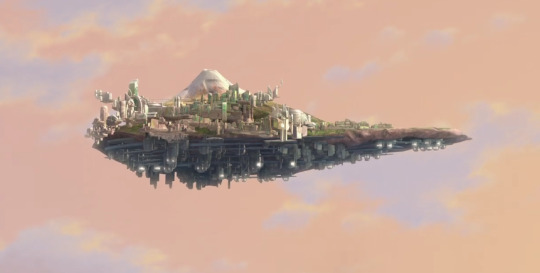
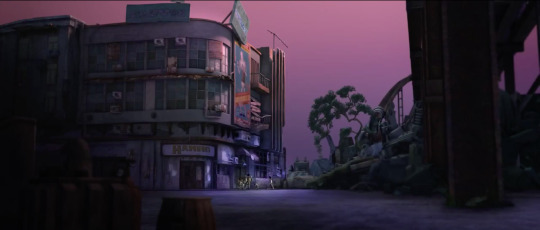
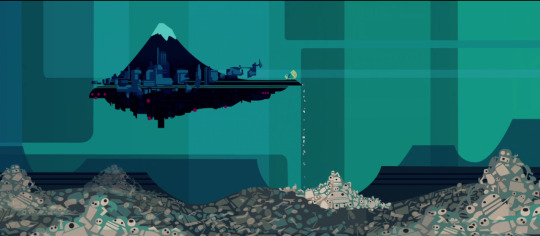
According to the opening of the film, Metro City was created when the people who would become the founders of the city noticed the world changing for the worse, and responded by taking part of the land and lifting it into the sky, creating a floating city - the opening voiceover refers to it as "an oasis, a floating paradise". Everybody else is left behind on what is referred to as the Surface, left to fend for themselves while the people of Metro City largely ignore their existence.
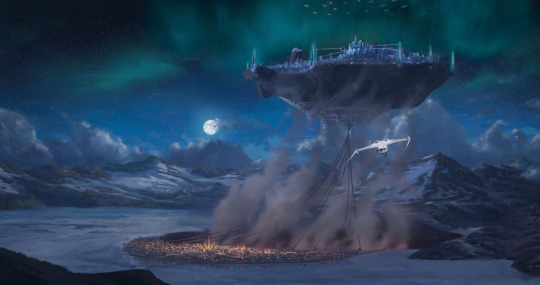
The parallels to Atlas and Mantle are crystal clear. Atlas and Metro City are both set up as a beautiful city above the clouds, meant to serve as an inspiration for the rest of the world. In reality, it's a place where the rich and privileged can live in comfort while shunning the poor. Meanwhile, down in Mantle/on the Surface, people are suffering and struggling to get by. Additionally, both 'surface' and 'mantle' are words that are associated with the ground.
The Blue Core (and the Red Core) - Penny's soul and Maiden powers.
Another concept that is (as far as my research shows at least) unique to the film is the Blue Core and the Red Core.

The Blue Core is a small sphere that is filled with pure positive energy, referred to as Blue Core Energy. It was created by Dr. Elefun, made from the fragments of a star that no longer exists - meaning that the Blue Core is all that's left, and cannot be recreated. This is reminiscent of how Pietro has no more aura left to spare, and thus is unable to give any more of his soul to Penny like he did the first time she died. In this allusion, the Blue Core is representative of Penny's soul and the power of the Winter Maiden.
When the Blue Core was created, there was also a byproduct - the Red Core. Essentially, it's the same thing as the Blue Core, but with negative energy instead of positive. If the Blue Core and the Red Core make contact, they both die - this is relevant later.
You could compare the Red Core to Watts’ virus, due to the way that it causes a robot to have red eyes and that it coming into contact with the Blue Core destroys them both.
Character Parallels
Before I get into this properly, I wanna give a quick side note. While Astro matches up to Penny perfectly, things get a little bit messier with the others in that we have a case of characters taking on multiple roles. However, this is far from unheard of in RWBY - let's not forget about how Blake represents both Belle and the Beast, Yang is sometimes the Beast to Blake's Belle, and Adam is an amalgamation of every antagonistic force in Beauty and the Beast. It's far from uncommon for a character to allude to multiple characters from the same allusion, or vice versa, which is what we see with some of the characters in this allusion as well.
Astro - Penny Polendina
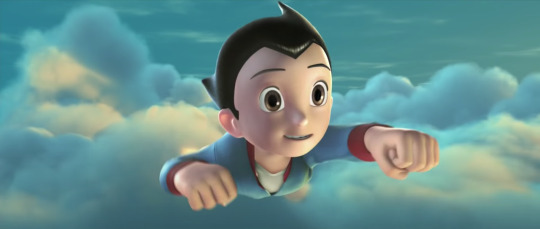

Unsurprisingly, Astro himself is our parallel to Penny.
After the death of his son Toby, Dr. Tenma rebuilds his son as a robot, using the Blue Core as his energy source. The Blue Core is stated to be unpredictable, and it's this that makes Astro who he is, what makes him unique from every other robot. As stated earlier, the Blue Core represents Penny's soul (and the Winter Maiden powers that are attached to it). When the Blue Core dies - and Astro dies with it - and Dr. Elefun is asked if he can be rebuilt, the answer is 'no' because the Core was unique and can't be remade - just like Penny's soul.
While Astro appears perfectly human on the surface, he's fitted with as much self-defence technology as Tenma could fit in him. The most iconic of these upgrades (and the only one that's consistent across every single version of Astro throughout the franchise) is the rocket boots. He even flies in a very similar way to Penny - pay attention to the posing, especially with the legs.
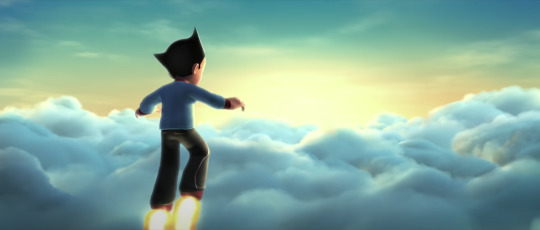

When Astro starts making friends with humans on the Surface, he conceals the fact that he's a robot, afraid of what they'll think of him when they learn he's not human. This matches up to Penny initially hiding the fact that she's not human, seeing herself as 'not a real girl'.
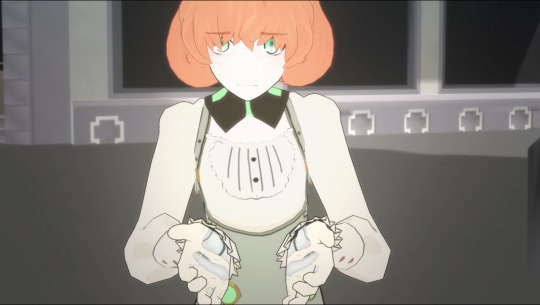
Astro has two father figures - Dr. Elefun and Dr. Tenma. Similarly, Penny has two father figures - Pietro and Ironwood.

During the climax of the film, Metro City starts to fall out of the sky and back down to the Surface. This is a parallel to two seperate moments in RWBY. The most obvious one is when Atlas is falling onto Mantle after the Staff of Creation is used. However, I think this scene more closely resembles the scene from Amity in which Amity Tower begins to fall.
When Astro sees that Metro City is falling, he immediately flies in to hold it up, despite the incredible strain it puts on him. This is a direct parallel to how Penny flew in to hold up Amity Tower.
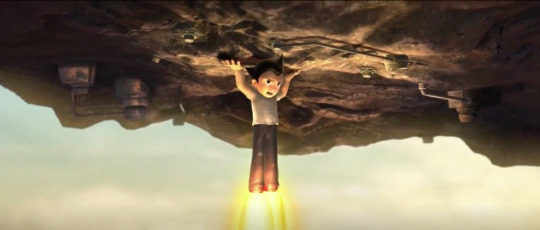
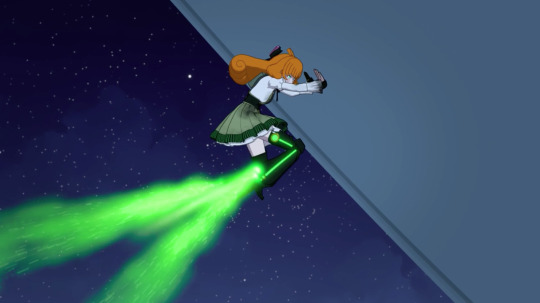
Astro pushes himself to the limit when he holds up Metro City, to the point where the flames from his boots burn so brightly that they turn blue - oh hey, doesn't that look familiar?

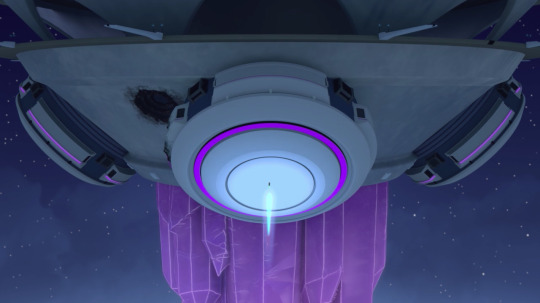
Astro also demonstrates self-sacrificial tendencies at a few points in the film. When he's captured in order to have his Blue Core taken out and placed into another robot, he simply accepts it, saying that "I think maybe this is what's supposed to happen...this is my destiny". This becomes a lot more interesting when you remember that the Blue Core is representative of Penny's soul and Maiden powers. Astro giving himself up to President Stone (the film's main antagonist who later ends up in a sort of 'fusion' with the Red Core) so that Stone can use the Blue Core could be a reference to the virus making Penny want to give herself up to Ironwood so that he can use her soul to open the vault - especially if we believe that the Red Core is connected to the virus in some way.
Near the end of the film, in the fight against the fusion of President Stone and a giant robot containing the Red Core (it's a long story, I'll get to it later in the post), Astro makes the decision to sacrifice his own life in order to destroy both the Red Core and the Blue Core, saying “this is what I was created for” and saving the lives of everybody else in the process. I doubt I need to explain how "choosing to die in order to protect other people" relates back to Penny in Volume 8.
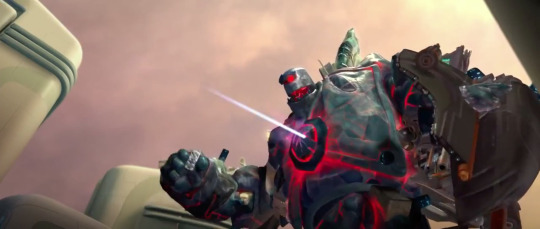
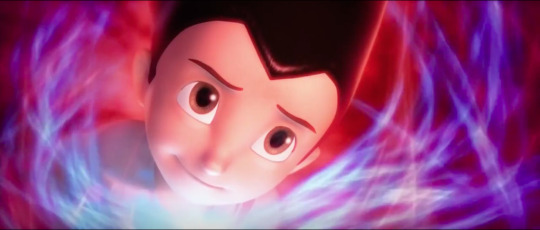
At the end of the film, and in the rest of the Astro Boy franchise as a whole, Astro takes it upon himself to be the protector of Metro City (and technically the Surface, but since Metro City has fallen, they're not exactly seperate locations anymore...). 'Robotic guardian of a city who's seen as a hero by the people' - you don't get much more obvious of a connection to the Protector of Mantle than that.
Additional details that may not be intentional but I still noticed anyway;
- Dr. Elefun describes as Astro by saying "That robot had more humanity than most of us". At this point, there's been many moments that affirm Penny's humanity - "You have an aura, Penny. A soul. That's who you are - our friend. Not a machine", "Her soul is who she is", the fact that she was able to receive the Maiden powers, all of these moments affirm that Penny has always been just as human as anybody else. This is also contrasted against Ironwood (and, for a while, Winter), who act more machine than human.
- Astro is actually rather heavily trans-coded. Penny is also trans-coded, but this is mostly likely a coincidence that happened as a result of the inherent transness of robots
- Elefun tells Astro that he's "not actually an entirely ordinary boy", which is reminiscent of Ruby describing Penny as "she's...not your typical girl."
- The shape of Penny's bow (the way that it sticks out more on one side while the other side is more vertical) looks similar to the shape of Astro's hair (this one was pointed out to me by @cosmokyrin when I mentioned this theory in the Frosen Steel server)
Dr. Elefun - Pietro Polendina
Dr. Elefun is one of Metro City's top scientists, and one of Astro's father figures. He is soft-spoken and gentle, a dreamer but a genius. In terms of personality alone, he's a pretty good match with Pietro. He's also the one who created the Blue Core, which draws a direct parallel to Pietro creating Penny's soul from part of his.
Dr. Elefun is the first person to truly see Astro as who he truly is. Dr. Tenma expects Astro to be a replacement for Toby, and is disappointed when he isn't. Similarly, everybody else sees Astro as a robot just like any other at first - an advanced robot, but nothing more than a robot. But Dr. Elefun gives him genuine praise, and encourages Astro to live his life and find his place in the world, just like how Pietro tells Penny that he wants to see her live her life.
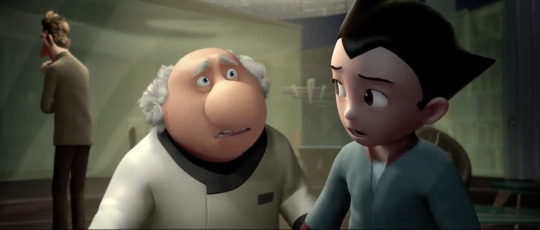

It's also worth noting that in most other versions of Astro Boy, Elefun takes the role of Astro's primary caregiver after Dr. Tenma no longer wants him.
President Stone - James Ironwood
President Stone is the current political leader of Metro City. For the entire film, his entire focus is on combat and military strength, and on multiple occasions he actively expresses his intention to start a war with the Surface. He believes that the best way to get re-elected is with a show of military force and violence.
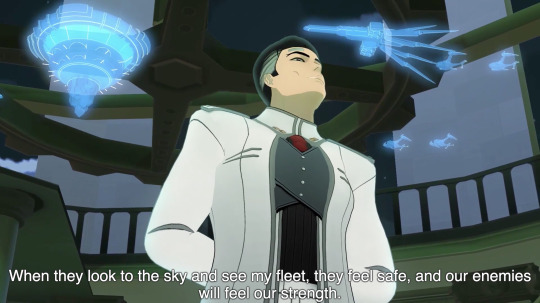
His primary goal throughout the film is to have Astro destroyed in order to retrieve the Blue Core and use it for his own gain. This is a direct parallel to Ironwood's goal in Volume 8 - to hunt down Penny and have her use her Maiden power to open the vault, and destroy herself.
Stone wants to use the Blue Core in order to power a specialised combat robot, ironically called the Peacekeeper. When Astro continues to escape his clutches, he decides to use the Red Core to power the Peacekeeper instead, but it doesn't completely go as planned. The Peacekeeper is equipped with what the film calls 'adaptive technology' - it's capable of absorbing anything it makes contact with into its own body.
And I do mean anything

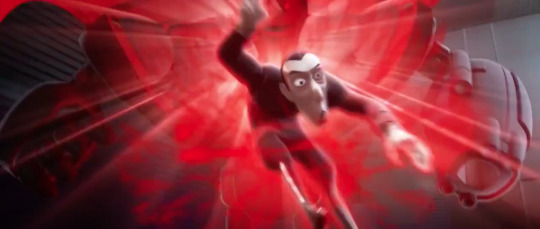
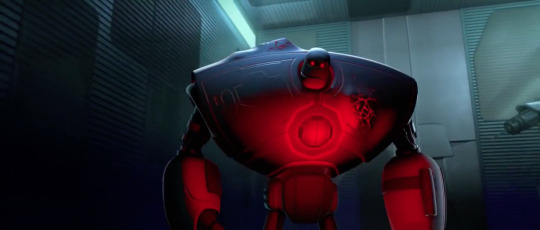
After Stone is absorbed by the Peacekeeper, he's in full control of it - essentially the Peacekeeper is nothing more than a metal outer shell. President Stone has become a fusion of man and machine.
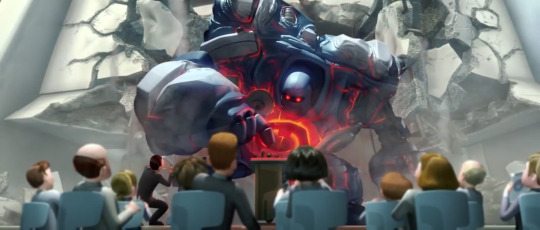

Dr. Tenma - both Pietro Polendina AND James Ironwood (a bit more Pietro than Ironwood but it's worth acknowledging both)
You might notice that while Elefun and Stone do have plenty of references to Pietro and Ironwood respectively, there are gaps where they don't cover every aspect of these characters and/or their dynamic with Penny. This is where Dr. Tenma comes in.
Dr. Tenma is Astro's dad, and the one who built him. He originally created Astro as a sort of 'replacement' for his biological son Toby after he died, giving Astro all of Toby's memories (more on this later). Naturally, this is a very clear connection to Pietro.
Additionally, Dr. Tenma uses the Blue Core - a completely unique, one-of-a-kind technological marvel - in order to power a single small robot that's intended to be nothing more than a replacement for his son, saying "I can't lose him again!". In this moment, Dr. Tenma is so focused on not losing his child that he doesn't acknowledge the big picture.
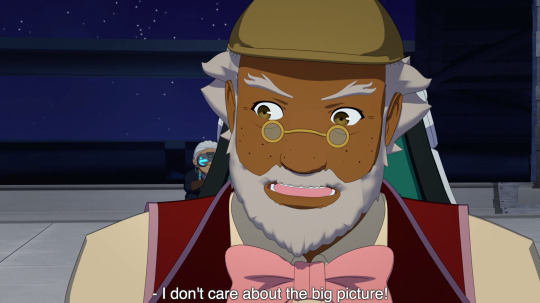
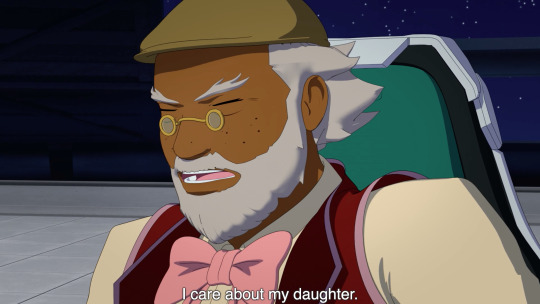
However, once Dr. Tenma realises that Astro isn't a perfect replica of Toby, but rather his own person, Tenma discards him, not caring if Astro gets destroyed or not. Similarly, when Penny stopped doing what Ironwood wanted her to do, Ironwood stopped caring about her as anything more than a container for the Maiden powers and is perfectly willing to let her die once the vault is opened.
Luckily, Dr. Tenma does have a change of heart, deciding that while Astro isn't Toby, he's still his son. Near the end of the film, Astro is very injured, and Dr. Tenma encourages him to get far away from the danger. However, Astro refuses to back down, instead choosing to sacrifice his life in order to stop President Stone, despite Dr. Tenma begging him not to go. Here, we have yet another parallel to this moment in Amity.
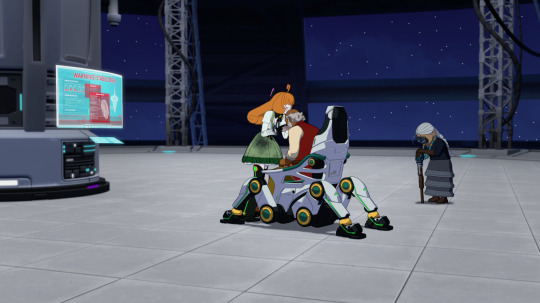
Bonus (aka characters that aren't perfect allusions, but connections do exist)
When Astro ends up on the Surface, he's taken in by a man who calls himself Hamegg. Hamegg ends up being a jerk, and while his personality and actions in the film don't particularly match up with any characters in RWBY, his backstory is a perfect match to Watts - a head scientist in Metro City who was shunned and fired for reasons unknown (Hamegg claims that they were 'intimated by his ideas and talent', but this was when he was trying to impress Astro and he lies a lot anyway, so this could be a complete lie).
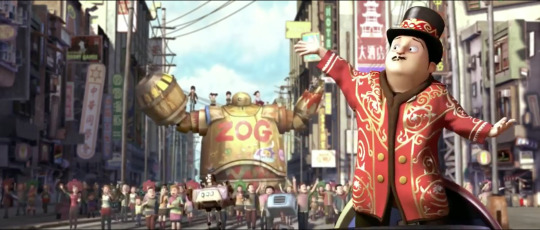
On the Surface, Astro befriends four human kids (Cora, Zane, Sludge and Widget) and their robotic dog, Trashcan. While the personalities don't really match up (though Cora, Astro's closest friend, does bear a visual resemblance to Ruby), the idea of a 4-person group + a dog could be a parallel to Team RWBY and Zwei.
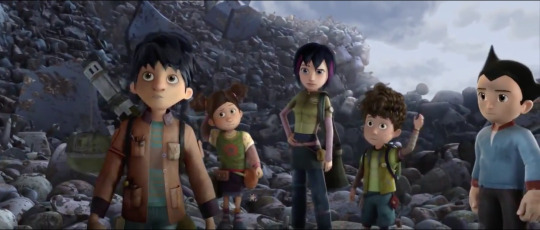
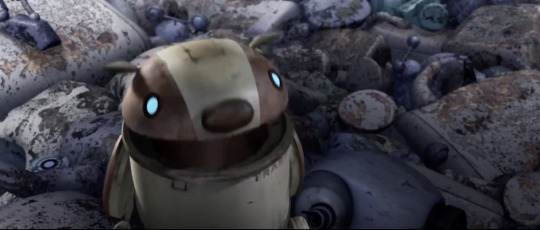

Zog is a very old, very large robot that had been 'dead' for several years until Astro found him and revived him by giving him some of his Blue Core Energy. Zog is our allusion to Winter - Astro giving Zog some of his Blue Core energy is a parallel to Penny giving Winter the Maiden powers. Additionally, in The Final Word, Winter explicitly calls herself a machine. While this does have significance on it's own, it could also be a nod to this allusion. That being said, the main connection between Winter and Zog (and possibly the most important part of this post) is based on events that have yet to happen in RWBY canon, and so I'm saving that part for the end of the post.
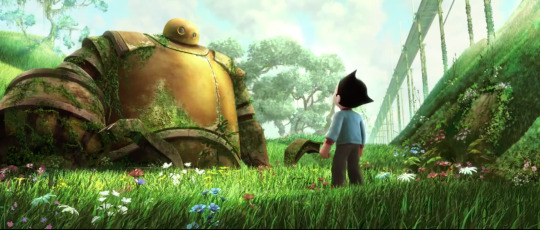
Story Parallels
Toby's Death
Toby Tenma, Dr. Tenma's biological son, was very similar to Astro in terms of personality (with some key differences), as well as having a strong physical resemblance.
When the Blue Core and the Red Core were first being shown off to President Stone, Toby was accidentally locked behind a sealed off barrier, trapped with the Peacekeeper containing the Red Core. Toby was killed in a blast that completely disintegrated him, leaving nothing but a hat containing a single strand of hair.
This hair is important, because Dr. Tenma used this hair in order to extract Toby's DNA and memories, which he was then able to implant into Astro in order to make him resemble Toby.
This scene is most likely a parallel to Penny's first death in the Vytal Festival. In her first death, Penny's body was destroyed, but her core remained intact. Her core, which contained all of her memories, was the key piece in properly putting her back together without erasing who she used to be. The strand of hair containing Toby's DNA is representative of Penny's core containing her memories.
Additionally, there's the fact that when Toby was rebuilt as Astro, he was given various upgrades to allow him to better hold his own in a fight, with the most obvious behind the ability to fly via rocket boots. Penny received similar upgrades when she was rebuilt as well.
It's worth acknowledging that Toby's death could potentially parallel the moment that Ambrosius separated Penny from her robotic body, with the strand of hair instead being her soul, separated from her dying body and then disintegrating. However, due to the timeline and order of events, I think that Toby's death is more likely to be a parallel to Penny's first death, and her separation from her robot body is instead a parallel to the next scene I'm about to mention.
Momentary Death
When Astro is captured by President Stone and taken back to Metro City, Dr. Tenma actually does remove the Blue Core from his body, which does cause Astro to temporarily die.

Luckily, it only takes a few moments for Dr. Tenma to change his mind and return the Blue Core to Astro, reviving him.
Astro's 'soul' was removed from his body, causing that robotic body to die, even though in the end Astro does survive it. This is reminiscent of Ambrosius removing Penny's soul from her robotic body, letting that body die, while Penny survives.
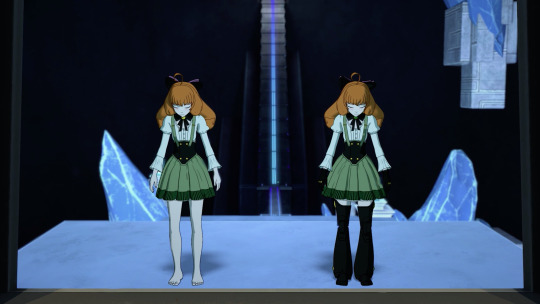
Zog
I briefly went over Zog earlier, but I wanna go into more in-depth about him, because the parallels between Winter and Zog and the implications of said parallels are the main reason I ultimately decided to make this post.
As I said earlier, Zog is a very old, broken down robot that nobody has been able to revive in years. When Astro finds him, he brings him back to life by giving him some of his Blue Core Energy. Astro essentially gives Zog some of his lifeforce, a part of his soul.

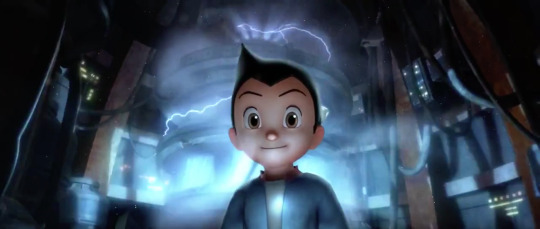
Winter was on the verge of death at Ironwood's hands, but Penny was able to save her by giving her the Maiden powers, and her soul with them.
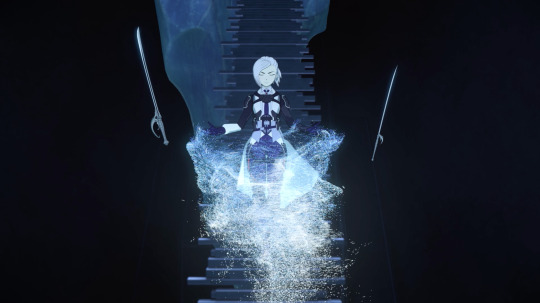
However, Zog doesn't keep all of the Blue Core Energy Astro gave him all to himself...
Resurrection
As I've mentioned a few times in this post, Astro does die - and I mean properly die, not a death that lasted 2 minutes at the most and had no consequences. Astro sacrifices himself and his Blue Core dies, all in attempts to protect the people of Metro City/the Surface and his friends. Dr. Elefun says that he can't be rebuilt because his Blue Core, his soul, was unique.

But then, Zog comes around. Zog, who is holding onto what is a part of Astro's soul - the only surviving part of Astro's soul. Zog returns some of the Blue Core Energy to Astro, which brings Astro back to life.

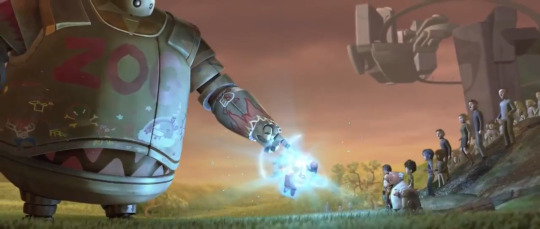
So, to recap: Astro gives a part of his lifeforce, part of his soul, to Zog. When Astro dies, Zog gives some of that soul back to Astro in order to revive him.
If you've been looking at the theories regarding Penny and Winter recently, this will sound VERY familiar. While the specifics vary, the essentials of the most popular theory is that Penny transferred her soul to Winter to hold on to along with the Maiden powers, and that somehow, Winter will return that soul to Penny in one way or another (either by putting her into another robotic body, or just somehow extracting her soul and letting it form it's own body again). The fact that this movie has these exact events occurring makes this seem more and more like the most likely route.
If Penny really is an intentional allusion to Astro Boy - which, based on the sheer length of this post, seems pretty damn likely - then the film practically spells it out for us. Winter will give part of her aura, the part that Penny gave her, in order to bring Penny back to life.
thank you for coming to my ted talk
#rwby#penny polendina#rwby v8#rwby theory#rwby volume 8#I've spent the past 2 days working on this#but the amount of parallels is insane#there's lots of bits and pieces I left out too#combine this with Pinocchio's three resurrections and the Narnia/Aslan theory and that's three allusions that foreshadow Penny's return#honestly I was just kinda chilling in my room yesterday when suddenly the scene with Zog came to me and I yelled HOLY SHIT out loud-#-because I realised it was the exact same scenario#there's probably some typos here and i could've included more pictures but like...it's 4am#and this thing is like 4000 words
481 notes
·
View notes
Photo

Who is it who really needs saving?
is the question Dabi asked when Tokoyami came to rescue Hawks in the middle of the raid war arc. Dabi asks this question just after Hawks stabbed twice in the back with the justification that it would save people, despite the fact that Twice was also a victim too, and also someone in need of saving. Dabi’s question is especially poignant because it asks who is hero society invested in saving, a question that is repeated by Twice who believes Hero Society only saves the good victims, and Himiko as well who asks if Heroes save people, then was Twice not a person.
I bring this up because chapter 299/300 end on another parallel between Dabi and Hawks. Both of them have their backs being shown, however, Hawks is already healing due to the nature of his quirk, whereas the permanent burns on Dabi’s skin has already gotten worse. Hawks and Dabi also have opposite goals at this point, Hawks to support Endeavor, and Dabi’s ultimate goal is to bring him down. However, Rei’s words over Endeavor’s panel add another layer of complication to this. “Those regrets and guilt, the rest of those have borne that burden much more than you have.” Endeavor is suffering, but he’s not the one most in need of saving. I believe next chapter rightly, Rei is going to point out that the ones most in need of saving are the ones who suffered the most because of Endeavor’s actions. Endeavor was never the one in need of saving, and in need of redemption in the first place, rather it was Dabi.
1. Started From the Bottom Now We’re Even Lower
Hawks and Dabi are seeming opposites even from their origin points. Hawks was born in a poor household the son to a minor villain, Touya a rich household the son of the number two hero. Hawks family name basically means nothing to the point where the hero commission easily erased it, whereas Dabi’s family name has dominated his entire life. Touya from a young age was given everything he needed to become a hero and his father even encouraged him, while Hawks was on the run from the law and couldn’t even leave his small house without getting yelled at.


At first, Hawks was born with a quirk that both of his parents disapproved of as they constantly asked him what his wings were even for, and seemed disgusted by his mutation. While at the same time, Touya was born with a quirk that his father was happy with, a fire quirk even stronger than his own which Enji thought gave him enough of a potential that he didn’t need to worry about finding an ideal hybrid quirk. He could pass all his techniques onto his firstborn son who seemed eager to learn.
The only real similarity between both of them was that for both children, Endeavor was clearly their favorite hero. Touya was eager to please his father and train with him in order to inherit his hero techniques, and when Endeavor captured Hawks father, it convinced Hawks that heroes were real.



However, both of them experienced a sudden reversal of fate. This is where circumstances for both of them flipped. Touya’s quirk was in fact revealed to be a very harmful hybridization of his parents two quirks, he inherited his father’s flames but even hotter, while at the same time inheriting Rei’s sensitivity to fire which made th overheating flaw even worse on him causing his quirk to deliberately harm his body. Hawks however, is an ideali hybridization of both of his parents quirks. His mother Tomie has a quirk that creates eyeballs and seems ideal for searching, watching and locating things, while his father’s feather quirks on his arms that could sharpen into blades turned into wings on his back that were both capable of searching and detection like his mother’s eyeballs and sharpening into blades like his father’s.
At first it seems destined that Touya was ging to become a hero, while Hawks had no hope for him, but because of the nature of their quirks the opposite happened. When Hawks was young he was able to save a busload of people from crashing which got him recruited by the hero commission. While it’s implied that Touya kept trying to train on his own even after Endeavor stopped the training and abandoned him in favor of Shoto, and because of that Touya had his training accident at Sekoto peek and burned to death.
Dabi and Hawks are seeming opposites, but they’re actually quite similar if you think about it. Both of them grew up in abusive households that are intentionally paralleled, they have controlling and physically violent fathers, and mothers who are coded as mentally ill, Tomie was unfit to take care of a child, and Rei was eventually pushed to a breaking point where she was unable to anymore and then forcibly separated and institutionalized by her husband. Both, also experienced a separation from their mother, Rei was hospitalized around the time Toya finally died, and the Hero Commission promised Tomie support if she cut all ties from him. Both of them also dreamed of becoming heroes, and tried their best to, even Touya after his father rejected him kept training on their own.
The only difference between them is circumstances, Hawks was saved because he was born with a useful quirk, Touya despite his father being the number two hero was never saved.
2. We’re the Heroes, Who Don’t Do Anything
In fact it’s implied that Enji intentionally looked away and forced himself to forget Touya’s suffering. For instance, the first time Touya trains with Enji he’s shown wearing a sleeveless shirt. Every time after that, Touya has long jacket sleeves on. When he’s crying to Natsuo, when he’s pulling out his hair, and the last memory from before his death, every time Touya is shown hiding his arms. We also know that Dabi, has burns that go all the way up his arms which is exactly where his flames emerge from. It’s also the place where Touya burns himself when Enji remembers training with him for the first time.
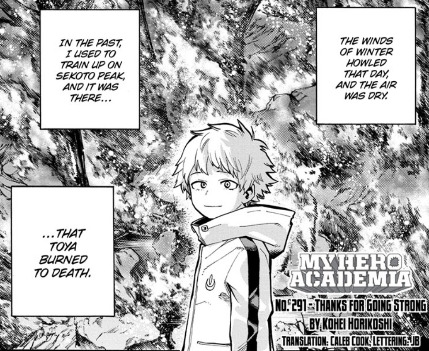
It’s likely that Touya was walking around with burns up his arms from the training he was inflicting on himself, and Enji simply didn’t notice because his unreliable narrator status, he forgets everything he has done to other members of his family, or intentionally downplays the severity of it in order to avoid the guilt and consequences of his actions. Hence why he can say things like “I never meant to neglect you” to Natsuo, when we saw him call Natsuo and the others failures from Shoto’s perspective, because in Enji’s perspective he’s just a good father who went wrong somewhere along the line, whereas from Natsuo’s perspective he never really acted like a father towards him at all.
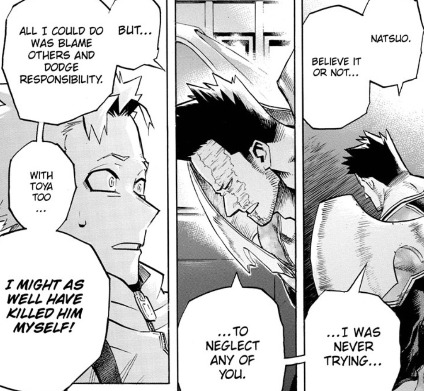
Enji only ever sees his own intentions, and not the impact his actions had on others. He only saw his heroic ambitions, and not the way he taught Touya that his only value was his quirk, and then completely tossed him aside as a failure and ignored all his suffering when Touya kept trying to get his attention. That he intentionally neglected Touya until either an accident or a suicide claimed his life.
Either way it’s a running theme that Endeavor hesitates when it comes to saving his own sons. Despite seeing himself as both a hero and a father, he completely fails in both roles to them.

He froze when it came time to save Natsuo from Ending, and the second time when Shoto was begging Endeavor for help against Dabi, Endeavor chose not to do a single thing. In fact the only thing that moved him was Deku’s pep talk that exclusively stoked his ego and called him a good mentor, which caused Endeavor to finally move into action.

Endeavor is a hero in name who has no interest in directly saving others, because his number one priority has always been to stand at the number one spot and feel like he’s accomplished something. He didn’t notice Touya was most likely continuing the training on his own, and was spiraling that badly until after Touya had died, and even after that happened he still continued the training with Shoto like nothing happened, even mentioning that Touya was a small mistake.
When the wounds from Touya’s death were still fresh, it seemed like barely anything more than an afterthought to him. There are some people who even theorize that Enji only believed Touya was always alive because he had never truly faced the guilt of Touya’s death and his role in it, that it was a comfort to him to believe his son was still secretly alive out there.

The signs were obvious that Touya was spiraling, but he was neglected so much that Endeavor the number two hero who prides himself on most cases resolved didn’t notice what was going wrong with his son until he literally burned himself alive, and even then that wasn’t enough to stop him from mistreating his other son and forcing him into painful training.
Touya’s neglect is as much abuse as Shoto’s favoritism and training, that’s the point of the golden child / scapegoat dynamic, they are both being abused. Enji was the only parent in the household, and if his kid was burning himself, and injuring himself all the time and it got to the point where the child literally died because of a lack of adult supervision, Enji could be prosecuted for manslaughter in a court of law. There are cases where adults just, do absolutely nothing for their kids, and those kids sometimes die of neglect, starvation, because of their parents completely failing to take care of them. It’s just as sinister a form of abuse as physical abuse. In both cases a child’s needs aren’t being provided for by their parents.
Dabi is someone who could have been easily saved by his father paying attention to him, and should have been saved by the man who prides himself as the number two hero, but he was left to rot. This is a running theme with Endeavor, he’s a hero who continually fails to save his family.

Dabi’s situation is also a metaphor for hero society at large. Who are the types of people that Hero Society prefers to save? Those who are useful to it like Hawks. It intentionally turns a blind eye to cases like Touya, Tenko or Twice. If Touya did have burns on his arms from training but was able to cover them up just by wearing long sleeves, and Natsuo was the only one who knew then that goes even further to explain Dabi’s specific obsession with discrediting Endeavor.
If Dabi’s father had just acted like a hero, or acted like a father then he would have been saved. If Dabi’s father had noticed the person most in need of saving was right next to him, the incident where he burned to death never would have happened. Which is why Dabi’s grudge is specifically against heroes who do not act like heroes. Heroes who, cannot save anyone because they are too self involved to perform the duty of saving. He shares Stain’s obsession with ideologically pure heroes, that only heroes who put saving others selflessly over everything else should be allowed to exist and the rest are pretenders to the title.

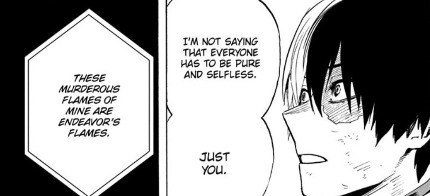
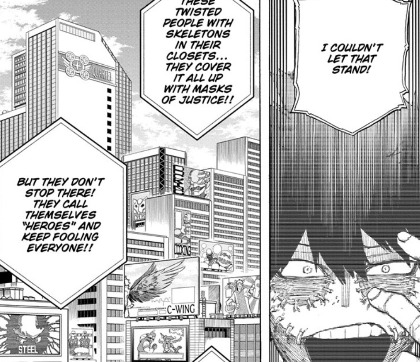
Notice how Dabi pulls on the scars on his face when begging the people to think about this, about who should really be allowed to call themselves heroes.
Dabi’s entire arc revolves around this question. Who are the real victims? Who are the ones that really need to be saved? Dabi is a character of mystery and subversion who is constantly hiding his real feelings.
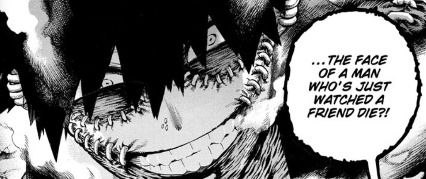
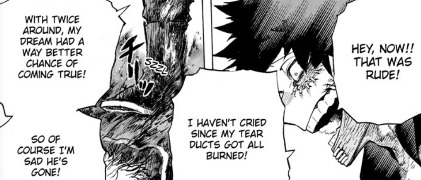
Dabi is commented on being heartless about Twice’s death, but his actions contradict his words. Dabi goes out of his way trying to avenge Twice even after it’s already too late to save him, even burning up his own body to do so. He tried so hard we see literally there are new scars growing on his back the next time we see him Post-War Arc.
I’d also like to bring up that while Hawks accuses Dabi of feeling nothing about Twice’s death, Hawks is the one who killed him, and who after the fact shows no regret in his actions because he’s completely justified it to himself. He even remembers Twice like he’s some kind of old friend he took inspiration from, and not a person he manipulated into trusting him then killed. My point is it’s a reversal, Hawks is set up as the one who cares about Twice as a friend, but really was only using him. Dabi claims he was only using him, but he’s the one who showed an actual emotional reaction to Twice’s death and made an effort to save him.
If I were to say this is one more point of foiling between Dabi and Hawks. They both don’t see themselves as victims and because of that they deny the victimhood of the other.

Dabi accuses Hawks of becoming a murderer because his father was a murderer. Hawks when he learns the truth about Enji, takes Enji’s side over Dabi’s, believing Endeavor being the true victim in need of help in that situation. This is because Dabi and Hawks both deny their own victimhood, and they project that on each other. Dabi denies his victimhood and pretends to be the villain instead, he’s the villain who is going to take down Endeavor and therefore he’s not suffering. Hawks denies his own victimhood and his abusive past and pretends to be a hero, he’s helping Endeavor become a better hero, so therefore all the abuse Endeavor committed is in the past so therefore he doesn’t have to think about it. Both deny themselves and therefore deny any similarity in one another.
They’re also two people fatally wrapped up in their own circumstances they turn a blind eye to the suffering of others. Dabi assumes that Shoto is “good” and therefore, must have been raised with love and had it better than him and was raised with love. Whereas Hawks assumes that Twice is “good”, and therefore worthy of saving because he helps other people. In both cases, neither Dabi nor Hawks really understand Shoto or Twice, they’re just judging them by their own projected standards. Dabi only understands his childhood as Touya desperately trying to work for Enji’s attention, so Shoto who had Enji’s attention must have had it good. Hawks was saved because of the bus accident where he saved people as a hero, so obviously it makes sense he reach out to try to save another good person who just had bad luck.
Despite the fact that both of them are pretty much emotionally dead and in deep denial of their true feelings.

Dabi has also made a show of how little he cares about Natsuo, while at the same time his most famous line from the pro hero arc is “overthought things and snapped...”
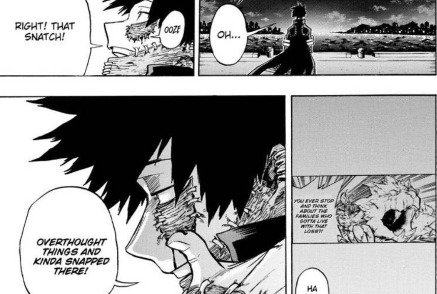
Dabi is also the only one who notices it’s dangerous to bring Tokoyami onto a battlefield. This is when he asks the question, who is it who needs saving.

We learn at around the same time, the hope from the Pro Hero arc was intentionally a set up by Dabi to bring Endeavor down, and show everyone eventually that Endeavor hadn’t truly changed.

These are all small details yes, but keep in mind we’ve really only gotten crumbs of Dabi’s characterization so far because his perspective is one that has deliberately been kept from us. We see his past through almost everyone else’s eyes but his own - because so far the focus has been on Endeavor.
Just like Dabi set up Endeavor’s earlier success only to bring him down, this might also lead to a reversal in the narratives. In 299, Hawks believed Endeavor to be the one in need of help. We are also as an audience set up to believe that the narrative arc will focus around Endeavor’s redemption. This is before the series revealed the circumstances of his son.
However, Endeavor and Dabi are literal opposites. They’re inversions of each other. Dabi pretends he doesn’t care any more for his family and will go out of his way to hurt them, that all he cares about is revenge, but at the same his ideals are heroic. In his actions and ideals he’s the one calling for a better society. Dabi is the most independent and distant from the league it’s true, and so far he’s denied their friendship, but at the same time it’s Dabi who is the most idealistic of the league. Shigaraki wants to destroy the current society, Himiko wants a society that’s easier on her, but it’s Dabi who has the ideals for a society he wants, one where heroes are held to standards and act like Heroes. It’s dabi better than anyone else who makes the standards for mass appeal. Because, deep down Dabi still has heroic aspirations and drive even if it comes from Stain of all people he’s inspired by. He has some sort of ideals, a world he’s trying to create.
Whereas, Endeavor doesn’t have any heroic ideals at all. His idea of being a hero has always centered around fame, status and the ranking of number one. He’s a hero unconcerned with saving people, only defeating villains to prove his strength. Endeavor presents himself outwardly as someone who is trying to do what’s best for his family, and working towards being the best hero he can be but his intentions are revealed to be selfish, at the same time as Enji’s narration is revealed as unreliable. It may have been set up for an inversion all along, with the setup being that Enji is the one who needed to redeem himself, when Dabi was pushed to the background. Around this time Rei also tried to reassure others, that he was trying to carry his regrets with him.

However, as soon as Touya’s identity is revealed, Rei’s stance reverses. Now she properly calls out that, Enji hasn’t been carrying his regrets at al.. Instead, he’s been forcing his family to carry the burden of it while he gets to go play hero in front of the public.
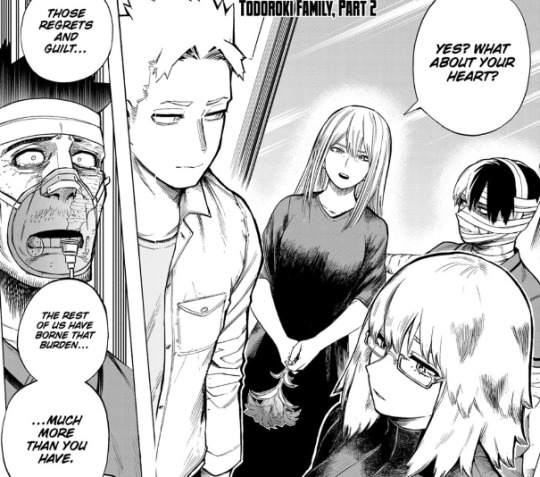
As soon as Touya is revealed to be alive, it’s not Enji who is the center and focus of conversation but rather Touya. In 299, Hawks believes that it’s Endeavor whose in need of saving, but we’re shown that Endeavor only really seems to pity himself in this situation.

It’s Rei who shows up to remind us, who really is in need of saving in this situation. Not Endeavor but rather those who have been burned the most by Endeavor’s actions.
Which may be the ultimate parallel between Hawks and Dabi as well, Hawks can’t see himself as a victim so he can’t realize who the victims who need his help the most is. Whereas, Dabi in the future may receive the change of heart he needs to reopen his heart again and accept others, and therefore learn to accept himself. Dabi is set up for a reconciliation between his two selves, Touya the victim and Dabi the villain. While ultimately, Hawks will intentionally turn his back on Keigo the victim, because he can only ever see himself as a hero.
I’m not suggesting that Dabi is good or Hawks is bad, or the other way around, not something as simple as that but that Dabi is open to change, and this will lead to him eventually opening up to others. Whereas, Hawks who is given practically every opportunity to change, and even escapes killing Twice with no permanent consequences, (his wings are growing back, and he even is freed from the hero commission) chooses to support Endeavor once again. It’s Dabi who calls others to think and reevaluate, and is actively trying to create a change in the world, whereas Hawks only interest is protecting other heroes and not the victims that heroes themselves create. Because in his mind heroes are good and that fact will never change.
Because Dabi is the one trying to create change, while Hawks continues to cling to Endeavor I believe we’ll eventually receive a reversal for both of them. Just as the narrative around Dabi has changed from irredeemable villain to person in need of saving, we may see exactly what was foreshadowed in this panel happening. Dabi walking towards the light, while Hawks falls further and further into the shadows - because it’s Dabi who is looking for that light, while Hawks chooses to remain in the dark. Hawks was saved once, and now he believes that everyone who is good gets saved, unless they are unlucky like Twice. It’s Dabi who knows the truth, that there are heroes who don’t save people, and it’s Dabi who is at least trying to confront that truth head on and change it rather than just ignoring it.
In a way Hawks is someone who has gone blind from looking too closely at Endeavor’s light, whereas because Dabi was failed by Endeavor and fell into the shadows he at least knows the truth about what it’s like for those who don’t get saved, and unlike Hawks can’t keep deluding himself that this is a world where everyone who deserves it gets saved.

#dabi#hawks#toya todoroki#touya todoroki#takami keigo#mha meta#my hero academia meta#my hero academia theory#bnha 299#bnha 300#mha 299#mha 300
801 notes
·
View notes
Note
and, if Albedo have his own personal botanist, what about xiao have his own personal chef, or something like that? the reader working at wangshu inn as the chef or maid 👀 (this the request... If you want to make something from this absurd idea 👀👀)
Hehe I like your thought process, anon. Albedo and Xiao really just: 😏👉👉 *finger guns* 👈👈 😑 for having reader assistants in my masterlist huh.
Making this solely a personal chef/maid thing would defo make this response hella short so I added in more info and background just like I did with Albedo's, so I hope you guys end up enjoying this one too!!
It isn't an absurd idea, but I sure as hell made an absurd answer to it kek
Xiao's Devoted "Chef"
Xiao with a Reader who is not only his Personal Chef but assistant

Background (let's gooo)
The arrival of the Adepti Yaksha in Wangshu Inn was really something I've been intrigued about for a while now, but I won't make much assumptions here because his banner is coming and more info would be given to us.
Xiao had long since been residing in and spends a majority of his time in this Inn yet its owners, Verr Goldet and Huai'an, barely knows anything about the adepti or his lifestyle.
So on a sunny, quaint day like any other where calmness passes through the lands without worry, they expected the Adepti to resign himself to a moment of peace and rest too.
So color them surprised when they save the familiar silhouette of the adepti ascending to the top floor. Porcelain white skin and clear tank top glittered with fresh blood as a broken and bruised figure lays unconscious in his arms. The couple was thankful that there were no customers out and about that day, because it would be a disaster for an audience to witness such a thing. Also bad for business, but they'll hold that in at the back of their mind.
Skilled workers were quick to work with their seemingly extensive experience with such a protocol. As they tended to the victim, the Boss stayed behind to tend to and inquire with the Adepti. Yet such a conversation between them came out strained:
There were no visible wounds that require immediate medical attention but there was a look in his eyes that feels much more broken than anything they can fix. Verr's hands hover over him in an attempt to urge him to clean up his still bloodied form. His amber eyes that were usually sharp looks through a distance light-years away.
"Xiao," the woman started and the eyes snapped out of its reverie, subtly looking around to ground himself. "What happened? And are you okay?"
"Their- the parents died from a Hilichurl ambush, I was only able to save the child," his crossed arms gripped at his forearm in the realization of his utter mistake. "32 seconds."
"32 seconds?" The Mondstadtian offered a fresh set of hot towels he had taken, and he had flinched when he saw the carnage that stuck close to his skin.
"I was 32 seconds late."
Your parents were adventurers who brought you with them as big fans of traveling and nomadic lifestyle, no set home yet freely living by. You were in your younger teens and you'd clarified you had no other family to go to.
The death of your parents came as an obvious shock to your young self yet you grieved in silence and sobs, as the only person you trust hovers next to where you rest in silent contemplation.
Verr knows that look, and it was something she hasn't seen on the Adepti before. Of pure guilt and a sense of responsibility.
That night you rested surprisingly nightmare-free as your savior stands his ground next to where you rest.
Present Times
The couple had adopted you into the Inn family without a second's hesitance and you were thankful for them as you were to Xiao. You were no heavy expense or disadvantage and that made it all the more easier to adapt into your new lifestyle.
Despite no words or explanation, you were perfectly aware of the deeds your savior had done to save you and keep you alive, and with that you had sworn to serve him until the end of your time. A life for a life, equivalent exchange.
Coming into terms with being in Liyue and the Inn, your life choices were meddled with commerce and the importance of livelihood. You were young but your guilt of being under the care of such people forced you to take on any and every responsibility you can handle.
Despite your background you were expertly skilled with cooking. Your mother and father always taught you the importance of a meal for adventurers whenever you'd camped out. And your special touch on dishes that saves adventurers had drawn in many appetites.
Business boomed and the Inn wasn't just famous for being a temporary residence, but a sanctuary that offers tastes paired with the divine sense of Celestia. You became Wangshu Inn's Head Chef, with your sous-chef Smiley Yanxiao.
At times where Xiao is forced to make rounds to seize looming threats, he'd find himself picking fresh and healthy ingredients he'd find on the way back and present to you for new recipes to experiment on.
But you also pride yourself with a different title, or titles: The Adepti's Personal Chef, Tender of the Yaksha, Adepti's Devotee.
This title was emphasized by the Sigil of Permission sewn into an armband hanging by your right arm, something you proudly wear even beyond the walls of the Inn.
You found out the Adepti's favorite during your daily visit and breaks, usually done so by hanging out in the balcony with him with a brand new recipe you recently made and wanted to test out.
While he sat parallel to you, he eyed the transparent syrup and the gelatinous substance in the obvious curiousity he shows for all your new creations, silently awaiting your opinion by watching your expression: whenever you show even the slightest distaste, he'll pointedly ignore his curiousity and the dish altogether. And if you express such pride and achievement, his interest will get the better of him, if you haven't offered the dish quickly enough.
"What is this?" He'd finally ask after your delighted moans, indulging on your own creation.
"Mmm, Almond Tofu... do you wish to try it?" Without an answer he'd pick up the only spoon on the plate and tasted it himself. And just like that, he'd froze, eyes full blown in surprise and awe.
"Do you like it?" He can only hum in response as he scarfs down the plate by himself, chewing respectfully yet with a hint of vigor in every scoop. "It tastes... like dreams..." the way he looked at you, with eyes possessing such childlike wonder, you couldn't help but fall.
After that, Xiao had requested a daily plate/offering of it. It became a routine to the point that all workers heard of the favoritism and are encouraged to learn the recipe. But it's usually your dish that is served, unless special occasions calls for someone else.
There has been an influx of dormers and adventurers recently as citizens around Teyvat flock to the Liyue continent in hopes to watch the most extravagant celebration of the new year, the Lantern Rite Festival.
Your best efforts manning the kitchen together with Yanxiao took gruelling hours just to prepare for the dinner's first course even with hours of prep time available. Even both bosses had to lend some hands as your sous-chef can barely keep up with your stride. And after the dishes are finally distributed to the dining hall, you were already set in cleaning up the kitchen, and before you knew it-
"It has been an hour."
"It was a busy day, I'm sorry, Xiao." You could only muster a mumble in guilt as you kept your head down on the usual table, refusing to look at the disapproving expression he definitely wore, except he doesn't. His face has the slightest hints of worry and wonder at your deflated composure.
But his focus now was on the food he has been craving the whole day, already digging into his dessert. And you just tried your hardest not to fall asleep on the cold, wooden tabletop. Until your tummy rumbled through the silence.
A hum. "You haven't eaten?" You shake your head as you lift your head, gazing at the cute sight of your guardian tilting his head to the side in slight distaste for your lifestyle. You open your mouth to retort until you felt the cold utensil touch your bottom lip. "Here, I saved you the last bite. After this, get yourself a meal and retreat to your quarters, I don't want to hear any excuses." He softly urges a little push with the spoon so you get the hint, and you wrap your lips around it, chewing and gulping down cold dessert. He offered his favorite food, used the same spoon, and spoon fed you with it—
"Wha... don't- don't bite the spoon," you squeeze your eyes tight from the embarrassing thoughts in your head.
When people wish to have an audience with Xiao, most of the time they head to you for guidance after inquiring with Verr. They require a sigil of permission, and most of the times, your own sigil has been under fire a lot in their desperation.
An old merchant who desperately wants to hire the adepti to aid his caravan with personal security once tried to claw at your armband, but a split second after the tip of his fingers had touched the cloth, he was blown away to the nearest wall.
"What-," a pressure on your left shoulder pulls your other against a lean chest, protectively squeezing as a polearm materialized in front of you. You can feel the ragged vibrations of the Yaksha's unusually heavy breaths, his amber eyes sharp and dangerous, dilated like a predator.
"What gives you the idea that you had the authority to lay a hand on my assistant?" Black and teal embers conjure around you two as a dark shadow slowly creeps up from the ground. "That is their sigil of permission; I want nothing to do with you mere mortals."
If not for Verr and the other staff, things would have gone gruesome and unsightly for the business. Yes, business. Everyone disliked the guy enough to care more about the Inn than his actual well-being. When he'd come to, he was forced out of the Inn (he would have done so himself anyways as he was already traumatized).
"Sir Xiao, why did you do that?"
"He didn't have a Sigil, he was pretty much asking for it. And why have you gone formal?" You pouted at him and his only response was a quirked eyebrow. Walking over to stand behind him, you slowly wiggled your arms through the gap between his waist and slack arms, finding it easy enough with how thin his waist is as you wrapped him in a hug.
He tensed from the secretly ticklish feeling before letting down his guard in your arms. This was one of your leeway as his most devoted follower. Your constant exposure with the aid of the divine sigil has made you immune to the negative effects of Adeptal energy, enough to make him nigh worry about your safety around him anymore.
And him letting you hug him like this... let's just say it's from your mannerisms of comfort when you were still young and around him.
"Take an indefinite leave," Xiao broke the silence a few minutes after, forcing you to crane your head to the side to look at him. He meets your gaze with an amused glint. "You have no debt to pay here, you shouldn't be holed up in a place like this."
"It is true that me leaving wouldn't have majooor repercussions, but what's with the sudden idea?"
He huffs. "You're my only follower and yet you divide your attention serving temporary mortals that will pass by without remembrance. And besides," you tense at the sight of an upturn on the edge of lip, pearly whites subtly peeking, "personal does not mean sharing."
You were an adventurer at heart and it's time you indulge in that glorified life of excitement, with your guardian by your side. It was the only gift he can come up with for your undying devotion.

Holy - I had to cut this thing A LOT because I wrotE A HECKIN LOT WTF?! It's not even done in my mind, my goodness, there should be an adventuring unit here too but hhhh I got too conscious of the length sksksks I'm so sorry! P-Part 2-?
I enjoyed writing this a tad bit too much sksksks but now that the second to the last installation of this even is published, the next request should be the last one! And that means I'll have to stop the poll and start working on the requests for the 100 followers one! So if you haven't voted there, you should before it's too late!!
#exile.flower#exile.goblet#genshin impact#genshin impact headcanons#genshin impact x reader#genshin impact imagines#genshin impact oneshots#genshin impact xiao#xiao#xiao x reader#i. fucked up#why do i always go haywire when given a simple prompt#i think this went too far hmm#followers special#gender neutral
818 notes
·
View notes